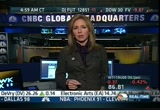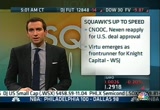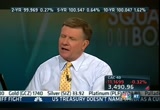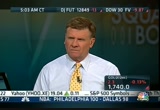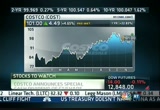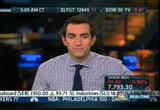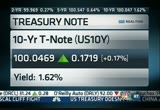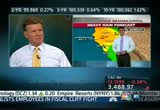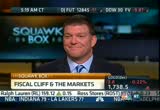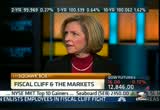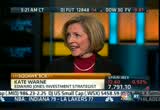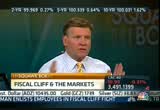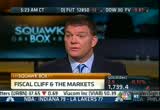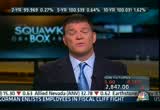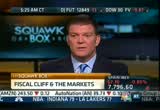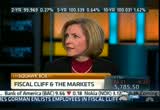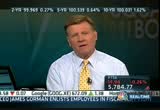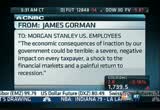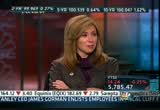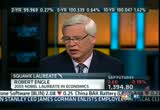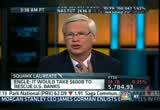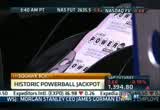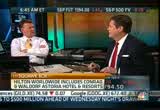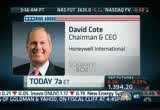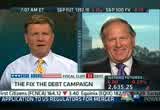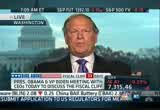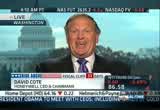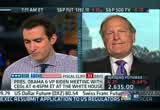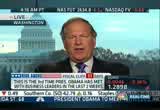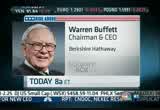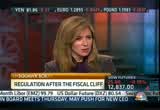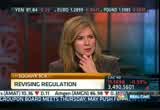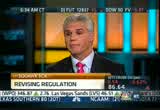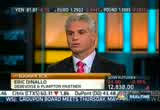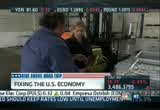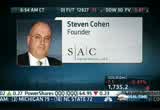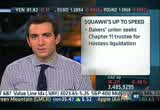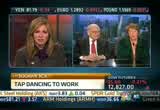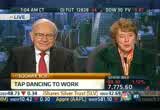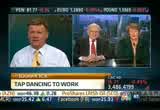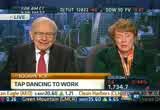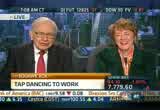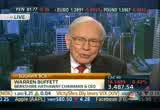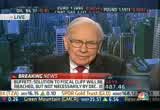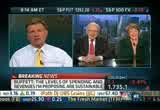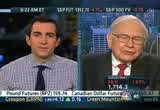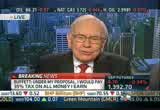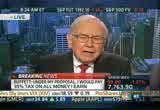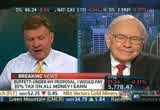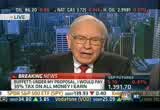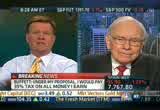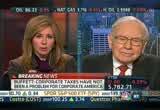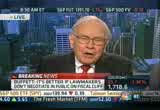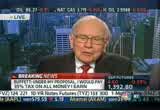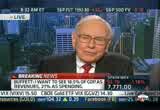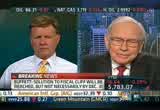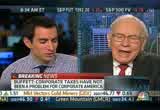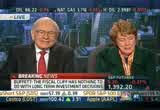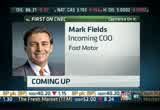tv Squawk Box CNBC November 28, 2012 6:00am-9:00am EST
6:00 am
ke kernen and andrew ross sorkin. there are few signs of progress in the talks on capitol hill. >> i would hope or friends on the other side can kind of turn off the campaign and get into a cooperative mode here to reach a conclusion. >> there's been little progress with the republicans, which is a disappointment to me. >> all that talk yesterday spooked the markets a little bit. we did see the dow closing down at the lows of the day. today we are looking for leaders with the courage to rise above the political posturing and try and get some work done for a deal to be reached. our guests this morning include honeywell chairman and ceo dave cote. he will be on capitol hill today taking his message to lawmakers. then coming up at 8:00 eastern time, we'll be joined by
6:01 am
weren buffett. he'll be joining us with carol lumis. let's get over to andrew, he has this morning's other top headlines. >> good morning to you, becky. the obama administration saying that china's currency remains significantly undervalued, but the u.s. treasury department is now stopping short of labeling the world's second biggest economy a currency manipulator. the white house is expected now to send the congress a multi-billion-dollar request on the recovery from superstorm sandy. the storm caused an estimated $71 billion in damages in new york and new jersey, and some congressional aides saying the request for funding would likely be at least $11 billion. the move comes as canada gets close to its decision on whether to approve the transaction. the energy companies say discussions with the committee are still in progress, and of course they had to file approval because they have extensive operations in the u.s. gulf of mexico.
6:02 am
"the wall street journal" reporting that virtue is emerging as the frontrunner to buy knight capital. they would possibly sell off parts of that business. finally, we can't get away from the story of twinkies. the bakers union of hostess brands wants a bankruptcy judge to appoint a chapter 11 trustee to ensure an orderly winddown. the union is saying it objects the allowing incumbent management to supervise the lick wi addition. have you finished your twinkies? >> no, we're back to saving them now. we need to talk, because i read a piece in the journal today, which gave me a new insight into -- >> the jenkins piece? fantastic piece. >> it's not the bakers. it's the teamsters. it's that distribution system which we heard about. one guy can deliver -- i think you have to deliver of wonder bread, each slice individually,
6:03 am
and then it has to be reassem e reassembled by someone different. i mean, we heard that. but maybe it's not the bakers. the distribution system was so antiquated -- >> but they breached the agreement with the teamsters. >> i know. did you see the piece yet? it's not the bakers, it's the teamsters. >> it couldn't have been a better piece. >> the ceo said it was the bakers, though. >> he sort of said it was the battle. the jacket's gone now. i want to see what it looks like. it looks good. you're stepping out. >> stepping out. >> that looks better on camera than it does there. [ laughter ] >> oftentimes i wear -- >> and i say that as somebody who wears things that sometimes look terrible on camera and on air and vice versa. >> still, that sounded backhanded. >> i didn't mean it as a back hand handed -- >> you looked at him and then you look there.
6:04 am
>> sorry. >> it kind of works with the tie. i think. >> it kind of works. >> it does. >> she's full of them today. >> wow. >> you have to give him credit because he's wearing something different. >> and i'm never going to. i can't. i did do the matt lauer with my hair. look, i'm losing it and i'm going to get it cut shorter. >> and you have a nice cut. >> when it's a little longer, i feel like people think i'm like combing it over and covering something up. look, this is what i got. >> i'm not only the president, i'm also a client. >> similar to yours, except for the eyebrows. >> did you get a cut? >> i got it kcut yesterday. >> your on the lebron james schedule. you get it cut every week so that no one notices a change. >> i try, yes. >> there's apparently some stocks to watch early on, one of which is costco reporting a better than expected 6% increase
6:05 am
in november same store sales. a retailer also announcing a special cash dividend has been declared of $7 a share. elsewhere, shares of green mountain coffee soared after the first quarter earnings and revenue beat the street. if you don't know, green mountain makes those keurig brewing systems and the k cups that go with them. also the current quarter in full year much more than what people were expecting. >> he was short on that. it came down. >> and then groupon shares got a boost. reporting that the company is discussing some management changes, including bringing in a new ceo. >> the ceo is speaking today in new york. there was this whole big scuttlebutt about whether he was going to cancel because there was this report that said he was leaving. so we will see if maybe he will
6:06 am
speak to this issue. >> interesting. it will be good to hear him. he's a character. >> complete and utter character. that is a good way to describe him. let's take a look at the markets this morning. yesterday, the markets did close at the lows of the day. a lot of concern after harry reid made some comments suggesting that maybe there was not a lot of progress made. eamon javers has commented saying you shouldn't read too closely into it, but this morning futures are indicated slightly lower once again. in europe, you'll see that there are some red arrows there as well. in france, the cac is down by about 12 points. in london, the ftse is off by 17. in germany, the dax is down by about 14.5 points. in asia overnight, same story. the hang seng was down by .6 of a percent. the shanghai composite was down by .9. the biggest loser was the nikkei. oil prices are slightly weaker, down by about 42 cents. the ten-year note at this hour
6:07 am
is yielding 1.62%. been watching the dlampl here's something that snuck up on us. the chinese -- >> you're going to start saying that? >> you want me to call it -- >> if you start saying this other word, i'm going to learn how to say it. what made you decide? >> i'm thinking rnd, which is how they lay it out. i'm thinking rnb. >> okay, if you're going to do it, i'll practice. >> that's how they do it. >> i say yuan. if you're ready to step up -- >> i'm not really ready to. >> i'm not going to fall behind in sounding smart. i think i've done that enough. >> i pick up my own. if i'm saying it incorrectly that doesn't make me sound smart. if you mumble it --
6:08 am
>> you're looking at me to pronounce this correctly. >> you're fine as long as it's not on the teleprompter. >> that's a sign of true intelligence. it means it's all up there. it's hard to form yourself into these teleprompter reading things. >> you should feel bad. >> no. >> the other thing is making mispronunciations is part of being a reader. because you read things. >> you never read it out loud. >> okay. >> gold prices a little weaker today. i think they're down by about $2.30. >> let's talk to another print reporter turned television reporter. kelly evans is standing by in london this morning across the pond with a little bit of red behind her. kelly? >> yeah, i'm glad i'm not the only one skrcrewing up pronunciations all morning. becky mentioned we saw this
6:09 am
weakness. the indexes across the board are lower and have a lot to do still with the mood that was set by harry reid. a little bit of news. we are getting the eu approving the restructuring plans for spain's nationalized banks. four of them, to be specific. importantly, the eu wants investors to take some of the losses in order to keep the total cost of the restructuring down. now, it's going to mean closing up to 50% of the branch for some of these banks. bond kia is rallying. as you can see, kind of a mixed reaction more broadly speaking. they are both lower by about 1%. as we work through the ramifications of what the eu is approving here, it's going to take some time for investors to figure out whether this deal is in the best interest of spanish banks or not. we are going to see assets transferred to spain's bond
6:10 am
bank. we're waiting for the details on that. a lot of investors expect that request to come some time in materially part of next year. it isn't just the sovereign debt, it's still dealing with restructuring its banks and still dealing with the cost of its regions, which need funding. spain also has to raise 200 billion euros next year. so just a reminder as we deal with the resolution of the issue in greece, spain is right behind and through the door. back over to you guys. >> all right, kelly, thank you very much. we've been watching thousand holidays have been shaping up here. john fulboni is the research co-founder. i know that cyber monday was a big deal. final numbers had it almost at $1.5 billion yesterday? >> yeah, it was a strong day as we expected, up about 17%. in conjunction with a strong thanksgiving and an even stronger black friday, it's a
6:11 am
really encouraging kickoff to the online season. >> i know this is the biggest day yet in terms of the holiday shopping, that it was bigger than black friday, but the growth trajectory was a little bit weaker than for black friday and some of the other days leading up to that. does that mean that some of those days are maybe stealing away from cyber monday and maybe this is going to be a broader shopping season across the board? >> yeah, i think that's exactly what's been happening, and wwe seen this now for a couple of years. the retailers are clearly beginning their aggressive promotions earlier than they have in years gone by, so that tends to pull some of the buying forward in the season. at the same time, we've also got the season extending later because of the reliability of shipping, and so it's -- in a sense, i think it's kind of flattening out a little bit this season. but if you look at it overall, we're expecting to see about a 17% growth. so it will be i think a very encouraging season when all is said and done.
6:12 am
>> bricks and mortar retailers justified black friday and all the big discounts they offer by figuring that they get people in the stores. they will end up spending money on other things they just see randomly as they're walking through the aisles and they'll come back again. what's the logic behind the big deals that the cyber sales -- the cyber guys are offering? do you actually spend more on other things when you show up at amazon for a big deal? >> i think it's very possible that could happen, but i think on top of that, you've also got the realization that the online retailers just don't want to let the offline retailers get a leg up on them earlier in the season. so what's been happening, as you look back over the past couple of years, is that the online folks are running their deals, timed to meet the demand that's coming if the offline world. so it's really becoming a multi-channel world as we go forward here. >> we want to thank you very much for your time and we will check back in with you as we continue through the holiday season. >> okay, thank you.
6:13 am
coming up, we know one of the main drivers behind recent stock moves is the uncertainty about the fiscal cliff. but buckle up, our next two guests say the action could soon get even more interesting. and later today, thousands are going to gather in manhattan's rockefeller center for the lighting of the christmas tree, making any visit to manhattan from here on out basically impossible at night. the annual spectacle has become a world famous symbol of the holidays. i went last night and it was okay. >> i went two nights ago. >> from now on -- >> i couldn't believe two nights ago, there was no traffic. >> it's over now. over. >> this year's tree came from flanders after surviving the strong winds of hurricane sandy. twins. i didn't see them coming.
6:14 am
i have obligations. cute obligations, but obligations. i need to rethink the core of my portfolio. what i really need is sleep. introducing the ishares core, building blocks for the heart of your portfolio. find out why 9 out of 10 large professional investors choose ishares for their etfs. ishares by blackrock. call 1-800-ishares for a prospectus which includes investment objectives, risks, charges and expenses. read and consider it carefully before investing. risk includes possible loss of principal.
6:16 am
welcome back to "squawk box." we look like we're going to have a little bit of red action before things start off. dow jones looks like it will be off about nine points. let's talk about some of the headlines this morning. bp agreeing to sell its interest in a number of gas fields to s abu dhabi's interests. >> we saw some snow here yesterday, but it looked a lot clearer here this morning.
6:17 am
>> a little bit of snow falling around the city. not the kind that caused too much problems. that's the good news. the big winter was west milford, new jersey. you saw two to six inches of snow. not too much to write home about, but it's still early in the season. a little bit of sunshine poking out. a few light rain showers and that's about it. today a drier day. chilly out there still. up to 41. 49 here in washington, d.c. pittsburgh up to about 40. and boston staying in the 30s. tonight, of course, big event in rockefeller center. temperatures will be in the 30s. breezy but clear skies. nearly a full moon outside as well. the big storm we're watching is in the west. three storms, you can see them pin wheeling here out to the pacific. the rain is now approaching into san francisco. northern california and oregon are all going to see very, very heavy rainfall, not just today but all the way through the weekend. flood watches are out. sacramento, stockton up toward reading and stretching all the
6:18 am
way up into oregon. we could see up to 20 inches of rainfall here, a big broad area of at least a half a foot. back to you. >> that is a waste. that should be over colorado and it should be -- >> exactly. >> so we had snow yesterday. last year we had snow early, it was like halloween and then we never got anymore. did the snow we had yesterday seem more typical? any idea about whether that portends that we have some snow this year on the east coast? >> last year it was like we used it all up early. we said okay, here we go, it's going to be a huge winter and nothing. we're looking at the long range forecast right now, it's all warm for most of the country. there are no big snowstorms at least for two or three weeks. >> but we don't know overall. >> beyond that, it gets fuzzier. >> you can't do like bill murray and blow all that stuff over to colorado. 20 inches of rain.
6:19 am
that would be like 50 inches of snow. >> 20 inches of rain would probably be like 250 inches of snow. you look at pike's peak right now, 14,000 feet there is no snow, anywhere. >> it's not your fault, really, i guess. anyway, eric, thank you. appreciate it. if you have any question about the connection between the fiscal cliff and stocks, mitch mcconnell said the democrats are still in campaign mode. oh no, don't pronounce the e. so it's warren. >> are we close at all there? not really? it is warne. have you been on before? >> no, i have not been on with you. >> then you really haven't been
6:20 am
on. >> sorry. >> jim freeman is principal at llc. i'm having mood swings about the fiscal cliff because i'm watching the way it works. and i go between if we did go over at least some of the things that we seem to keep putting off start happening. if we don't go over, i worry that we just take the easy way out and we don't really accomplish -- we just delay the inevitable. where are you on that? >> well, we'd rather see a fist calf stair step. in other words, instead of a cliff, that you reduce the deficit over time in a much more orderly fashion. >> with a plan, though. >> with a plan. exactly. bowles simpson was a plan. >> bowles simpson is so far gone at this point. >> but when you look at those, they all have some come by neigh of spending cuts and tax increases. the idea is that over a period of time, you basically put the country in a better path, the government in a better path to
6:21 am
spending and taxation. what you don't want is the fiscal cliff because that was designed to be something that nobody liked. and the reason is, yes, you've reduced the deficit from about 7% of gdp down to about 4% of gdp, so you move in the right direction really dramatically, but you do it in a way that nobody was happy with exactly where those cuts come from and exactly how the taxes increase. >> with what you're seeing, and we never know, it's almost like a mating dance where you've got the male and a feel of some species -- >> it's an ugly one. >> looks like they're never going to do it. they get closer and closer. >> but there is a lot of -- they back off and they might even look like they're fighting. but do they eventually, you know, do it? >> well, i think certainly everybody hopes so. because it would be better than if they don't. >> that didn't help. >> that wasn't so good. but think about it, there are three alternatives. >> not that there's anything wrong with that.
6:22 am
>> there's three alternatives. they decide that they can't figure it out and they do just push it all off to the future, kick the can down the road, which wouldn't be good because you don't address any of the long-term problems. there's the we go off the cliff. that also wouldn't be good. i think because the cliff is a whole variety of very specific changes, and everybody wants to pass the amt patch and everybody wants to do the doc fix. there are a bunch of things that everybody agrees want to be done, i think that's where you get into the slicing and dicing and i think that's probably a better way to think about it than a mating dance. >> you're still going to get a watered down bill. they're talking about pushing it to above 500,000, that that doesn't do anything. if that's the case, it doesn't raise a whole lot of money, particularly when you have the democrats saying they don't want to see any entitlement reform. >> but durbin, where did he come from? >> that's what i mean. >> i'm trying to figure out -- trying to see his personal
6:23 am
situation. where did he find religion all of a sudden? he's an obama ally and suddenly he's talking -- are you looking at all these things very specifically? looking at the fix and option action. you can tell from the market. >> the most aggravating thing is that we're sitting here talking about the government and what the market is going to do as a function of what the government does. if you look at the volatility markets, i think it's incredibly interesting. the market is being very rational. the vix is really a function of liquidity. liquidity in the system is incredibly stable. the markets are -- that will significantly drive higher levels, if you look at ted spreads and where bank funding is. that's the real significant spikes index, so you need to be careful to hedge your portfolios right now. but right now, the markets, the s&p markets are really pricing in a very range bound market
6:24 am
through january. 1,400 strikes. it's a $60 package. so you're really looking at a 1330 to 1460 type of range. >> what's the downside if there's no deal? >> the market is really not expecting much of a downside regardless. i mean, you have continuous fed intervention. you've got a new bank of england chair. >> you think on january 1st, january 2nd, january 3rd with no deal. >> i think we could see 1350 or so. >> but that's the low? that's the bottom for you? >> the talk for a 100, 200-point correction is clearly extremely outside the balance of what people are expecting. >> this isn't talk then. the idea that you go over the cliff and there's this enormous pressure, you think it's not there. >> the comment -- every account that i talk to, which i think is very critical, is we do get back to very cheap equity valuations in general, and really, if we start to release some of this
6:25 am
regulatory -- i don't know if taxes is the biggest concern, but some of these regulatory issues and some of these concerns, people really see value in the u.s. equity markets. so they don't see a tremendous amount of downside and they do see a tremendous amount of upside if some of these issues get worked through. >> what would happy alleviate -- got four years of regulatory stuff. what would alleviate the regulatory stuff? >> certainly the fiscal cliff issue is the biggest issue. >> you're calling this a regulatory? >> there will be certain knock-on functions as a result of these negotiations. >> the dow lost 1,100 points in pretty quick succession over the course of two weeks. was that just the idea that the fiscal cliff was out there and we had these negotiations taking place, or do you think that brought things dunn s down to of we factored it in. >> i think we factored it in more right now. there's a bit of an unknown. we do know that the fed is in play and will continue to stimulate. what we're really fighting about is we have an idea of what s&p earnings are going to look like,
6:26 am
plus or minus. and now we're really looking at the growth function of it and what multiple do we assign to the marketplace. are we going to shave a full multiple? we're really talking about if earnings are $115 a share on the s&ps, we're talking 50, are we talking 100 points, something like that, a really draconian scenario. that's really what the market is foe cushion focusing on right now, if we do get this fiscal cliff issue off the table and we do get some policies out of washington that are less draconian. >> it looks like they're so far apart that any deal they do get is going to be a pretty weak anemic kiss your sister type deal. does it appear that? >> it certainly does appear that way. i think that what they do, even if it's a weak deal, that at least gives people some certainty short term and then you get the market rallying on the assumption that they will
6:27 am
fix things in increments over time. and that's okay. coming up, pull out the white tie, we've got a nobel laureate in the house. we're going talk risk and the global markets. that's all coming up next as he makes his way to the table. ♪ ...could end with adding a close friend. the lexus december to remember sales event is on. this is the pursuit of perfection. [ penélope ] i found the best cafe in the world.
6:28 am
6:29 am
part of a whole new line of tablets from dell. it's changing the conversation. ♪ it's changing the conversation. well that was uncalled for. folks who save hundreds of dollars switching to geico sure are happy. how happy, ronny? happier than gallagher at a farmers' market. get happy. get geico. chances are, you're not made of money, so don't overpay for motorcycle insurance. geico, see how much you could save. [ female announcer ] today, it's not just about who lives in the white house, it's about who lives in the yellow house, the green, and the apartment house, too. today we not only honor the oval office, but we honor the cubicle, and the home office as well. because today it's about all of us.
6:30 am
6:31 am
i'm joe kernen along with becky with three names.ross sn making s, president obama is going to meet this afternoon with ceos of companies including home depot, goldman sachs, merck, coke, macy's, yahoo! caterpillar, comcast, marriott, and at&t. among the leaders calling for leaders to rise above is morgan stanley's ceo james gorman. in a memo to employers, gorman writes in part, in his words, i would ask that you communicate with your senators and congress people to urge them to work together on a bipartisan compromise that averts any immediate fiscal cliff impact and puts the u.s. on a sustainable path towards long-term economic growth and deficit reduction. hard to believe he could get through all of that and not use the term "rise above." he's deliberately leaving that out. he goes on to say the economic consequences of not rising
6:32 am
above, he could have said, but he said of inaction, by our government could have been terrible. severe negative impact on every taxpayer and a painful return to recession. the e-mail includes a link to help employees find their representatives in washington and send an e-mail. i like this, but everybody -- send the link to the white house. rise above. i'm not wearing one today. >> i noticed. >> i'm not. because i think the white house is thumbing their nose at me. >> at you personally? >> at me personally. i'm wearing that, they're saying no, joe, no. did you read the front page of "the wall street journal"? hardening their positions. >> the democrats certainly are. what i wonder at this point is if the president by campaigning so hard to push it this way is going to push part of the wing of his party so far that they won't be happy with the deal that he comes up with. >> all i can figure now,
6:33 am
considering that he would own, at least share the ownership of a recession that would come from this, is that if he continued campaigning, which is what i think it is, a lot of the rhetoric, is to try to take the house in 2014, to try to paint the house as so obstructionist that then you have the senate and then you have the house and tough executive branch. >> i think they feel like the pressure would probably be too much for republicans. >> considering that we all want to avoid a recession, at this point what are you campaigning for? you're campaigning the try and win back the house in two years, in 2014. that's what i think. that's the most cynical view. >> i hope it's not the case. but i would imagine it's an element of it. >> the weirdest thing, the democrats hated the bush tax cuts. hated them. hated the bush tax cuts. now the idea that we don't extend 98% of them is the end of the world for democrats. suddenly they love these tax
6:34 am
cuts. we can't live without these tax cuts! however, republicans are now saying let's go ahead and let all of them expire. now the republicans don't love the bush tax cuts and the democrats do love them. it's totally switched. >> that is true. >> and you know what? i would never think that i would agree with this. he makes a really interesting case. that the united states by far has the most progressive tax system of any advanced country but it's not enough to help narrow income inequality because our overall tax revenue is too low and the middle class is the only people that can come and generate enough revenue to really help the people that are in need. >> which you probably have to do that, but you have to raise rates on the richest or at least find a way to bring their tax rates higher. i don't even understand w we're having this argument about marginal rates. it's stupid. >> you can't go high enough. where is your cutoff? if it's not at 100,000 -- if it's at 250, it's already too
6:35 am
high to raise any serious money. >> they're going to come in at 500,000. >> that's even less money. but the bigger question is what happens? do you do this along with reform for the entitlements or not, and that's where i wonder where this discussion has gone. >> i'd like to find the things about the fiscal cliff that are the absolute worst. and i don't know what -- i mean, the entitlement reform is good. the raising tax rates is probably good. >> the thing that concerns me is because it's not targeted, if you have something -- you have companies like lockheed martin saying this is going to mean massive layoffs. >> lockheed martin is a safer cow. there's got to be fat in the defense industry. >> what about aetna who says this is going to lead to layoffs to the point where it increases their medical costs. so they're going to lay off people. >> we should introduce our nobel laureate. >> we do have a nobel laureate at the table. robert engel is a nobel laureate
6:36 am
in economics who won the prestigious award in 2003 for his work analyzing volatility. he's also a professor of finance at nyu's school ofs. while we have you, do you have views on the fiscal cliff? >> you know, the fiscal cliff is on everybody's radar, but i think it's not the only thing that needs to be on our radar because i think that the situation in europe could actually turn out to be just as damaging for the u.s. economy as the fiscal cliff. >> is that a picture of us if we don't handle our problems here too? is that the ghost of the future? >> i think in both cases, we're talking about politics getting in the way of economics. i think the fiscal cliff could be dealt with exactly as you said. if the politics weren't such a big issue, this could be solved. >> so what would be the best way to solve it, do you think? >> you know, i think there is -- what we need for this economy
6:37 am
generically is austerity in the long run and some stimulus in the short run. and, you know, crafting that as part of the solution to the fiscal cliff is the issue. >> you put together a study on systemic risk and you rank countries. >> right. >> your number one most risky -- systemically risky country is japan. >> it's japan now. amazing. >> take this back to us for one reason. are we japan on a separate issue, on this issue, on the next sort of five, ten years? >> what happens with our measures of systemic risk is that when financial institutions have too small a capital cushion, they're in danger of default, but among other things, what they do to improve their capital cushion is to stop making loans. they become very conservative,
6:38 am
and that's what happens -- has happened in japan is the banks have tried to stabilize themselves and this hurts real economy. and that's the question, whether the banking system in the u.s. and the banking system in europe can actually provide the functions that it needs to provide for the economy to grow. >> can they? i mean, where are we on a relative basis? if japan is the number one systemically risky country, where are we? >> number two. but the systemic risk -- what it is is it's a measure of dollars. how many dollars would these banks really need so they can become ordinary functioning participating banks? so the u.s. is much bigger than japan. so relative to gdp, the u.s. lead is good to smaller. if you look relative to gdp, the worst country is cyprus, little cyprus. but the second is switzerland.
6:39 am
switzerland has a banking system which is so big compared to its gdp that if they have to rescue their banks, they're going to be in big trouble. >> where is china on this list? >> five. >> why? >> because the chinese banks, over the last -- well, five, ten years, have taken on a tremendous amount of debt. their balance sheets and their liabilities have increased. and their equity values -- >> safest country in the world? >> i think that we probably are only seeing the tip of the iceberg when we measure this. >> you're mainly talking banks. you're not even talking about our 85 trillion in unfunded liabilities. you're just talking banks. >> that's right. we're talking about financial institutions. >> yeah, of financial institutions of countries. >> this is not sovereign at all. >> it depends on what you add for liabilities. i mean, the liability is all over the place. the reason spain is in
6:40 am
trouble -- >> they don't have 86 trillion. >> no. >> china might. >> their big liability is rescuing their banks. >> right, right. compared to what our future promises compared to what we've set aside, we've got issues. >> we've got issues. and those have to be dealt with. but i don't really think that the fiscal cliff is a very efficient way of dealing with it. >> agreed. >> but a little time pressure probably is a good thing. focuses the attention. >> professor, thank you for being here this morning. >> thank you. if you have any comments or questions about anything you've seen here on "squawk" this morning, go ahead and e-mail us. when we return, a new concept at hilton hotels. think luxury. we'll have the details right after this. before we head to a break, though, you may want to stop and buy a lotto ticket on your way to work today. i know, joe will never let us hear the end of it. >> go ahead, you could win. >> someone could win the largest
6:41 am
power ball jackpot in history. >> i'm jealous. >> you're going sorry. >> you're probably going to win. one in 175 million. good shot. >> in fact, andrew, we're going to buy more tickets. it will be joe and the crickets. anyway, the odds, we admit it, 175 million. if we want to improve our schools... ... what should we invest in? maybe new buildings? what about updated equipment? they can help, but recent research shows...
6:42 am
... nothing transforms schools like investing in advanced teacher education. let's build a strong foundation. let's invest in our teachers so they can inspire our students. let's solve this. now we need a little bit more... [ male announcer ] at humana, we understand the value of quality time and personal attention. which is why we are proud to partner with health care professionals who understand the difference that quality time with our members can make... that's a very nice cake! ohh! [ giggles ] [ male announcer ] humana thanks the physicians, nurses, hospitals, pharmacists and other health professionals who helped us achieve the highest average star rating among national medicare companies... and become the first and only national medicare advantage company to achieve a 5-star rating for a medicare plan... your efforts result in the quality
6:43 am
6:44 am
hilton worldwide's luxury brands unit is looking to be the fastest growing in the world. joining us now is the global head of luxury and lifestyle brands for hilton worldwide. i immediately think, john, that no matter where you are at a point in time when you think back four years ago compared to where we are now, you've just
6:45 am
got to feel pretty good. >> it's amazing. we saw this after the gulf war, we saw it after 9/11, we saw it after that economic downturn. our business always comes back. people are looking for those luxury experiences. >> but at the time, people were saying maybe you don't want to invest long-term luxury. you had sort of politicians saying you don't want to go and spend a lot of money necessarily. >> the whole thing is luxury is dead. >> it's carlton. >> we've come back. and actually, there's two reasons. people are looking for those experiences. the second reason is there's this whole new class of luxury customer. so they're 35 to 45 years old. they're just as likely, a lot of the hedge fund guys you probably have on the show. they're in brick countries. they're just as likely going to the hamptons for the weekend for their soccer game. when they step up, they want to step up. they want to make sure the experience is as great as it can
6:46 am
be. >> so they might not be billionaires, but they can save up and for a week they can feel like billionaires. >> exactly. my job is to make sure that stay is better than ever. >> and they don't feel as guilty as ever. >> they're more casual in dress but more demanding in the services that they require. >> what does that mean? what are the services? >> let me give an example. today we're here to talk about the conrad concierge. we're offering a terrific hole in seoul and launching the conrad concierge. yesterday i was in my office in mclean, virginia. i booked valet service for last night to make sure that my suits were all pressed. i ordered my wake-up call, my room service and i did it all on my iphone. >> so you didn't even have to talk to anyone, other than siri. >> but i had a few minutes, so i scheduled it. it's a lot different than a lot of the other hotel companies are you can communicate to a front desk staff.
6:47 am
this baby is hot wired, so anything you need is hot wired, it goes directly to the valet, goes directly to room service. >> and i can trust -- i always get nervous if i even leave a wake-up call on the machine. it definitely goes through. >> a text message back to you to make sure that you're all set. so 75% to 80% of travel is done either through the internet or a mobile device. 38% is booked through a mobile device. but nobody has taken it past the front door where it's totally hot wired. and then you get into the kind of flawless service thing. >> we were just talking about the lottery, joking around about it. what people really want is more time and freedom. >> luxury is more white space on the calendar. >> where would go to get this service? >> if you book at a conrad hotel. or even if you're a hilton member, go to the itunes store and once you are in the system,
6:48 am
we know what you want, what your trends are. >> i can't get anything illegal, right? >> no. >> are you sure? depends on the country. >> maybe a lottery ticket or something. >> okay. you just said anything you want. i looked over at andrew immediately and he was looking at me. >> just trying to figure out what -- >> i know where your mind is. i looked at you and channelled what you were thinking. >> i was thinking of coffee. you remember? >> i do. >> so we're really -- we had the conversation earlier, luxury really has returned very strongly. we are trying to be the fastest growing, most innovative luxury hotel company on the planet. we have two horses in that race, waldorf historia, which is more than one hotel in new york. it's 23 hotels located throughout the globe, places like shanghai, the number one hotel in chicago. we also have another concept called conrad. we just opened one in battery park, which is conrad new york.
6:49 am
an outstanding hotel. and we are kind of living our vision of being the fastest growing. but it's all about those guest experiences and attracting individuals like yourself to our hotels. >> exactly. say it loud and say it proud, luxury. you're not ashamed. you're not embarrassed about being pampered, spending a lot of money. >> absolutely. >> right? >> the aig effect or whatever, even in meetings, people realized they left us for a w l while and they all came back because they want the services. at the end of the day, if you're going to have one big meeting a year, you want to do it at a luxury hotel because everything goes smoothly. >> you employ a lot of people at those luxury hotels that benefit when business meetings come there. it's called the velocity of money in the economy. >> the virtuous circle. >> what's your best operating hotel right flow? >> well, they all are, actually. the waldorf historia chicago, we just won number one in the u.s. for travel and leisure, it's way up there.
6:50 am
waldorf historia shanghai is outstanding, one of the best hotels. we even have a waldorf historia in orlando. >> one question, because we're going to have to go. which is more profitable, the truly luxury stuff or some of the the lower end stuff? from a profitable perspective. >> margins probably are better at the lower end depending on the concept. >> wow. >> it's very expensive to do luxury well. >> but the top line, the top line is so high that the absolute return is pretty substantial. >> you don't have any free wi-fi, any personal questions for him? >> is wi-fi free? >> not in every hotel. in most hotels. >> why is it always free at the low-end places. >> you should have said yes. >> now he's -- has a lot to do with lodge net, we can talk about that off the air. >> we're playing christmas music. >> you guys use lodge net,
6:51 am
people know what lodge net is. >> i don't. >> i think you may. >> coming up, the offbeat -- it's the on-demand services at hotels. coming up, the offbeat stories you won't want to miss and then later our news maker of the morning warren buffett, his fiscal cliff advice to washington all coming up at 8:00 eastern time this morning. le an] this december, remember -- ♪ you can stay in and like something... ♪ [ car alarm deactivates ] ♪ ...or you can get out there with your family and actually like something. ♪ the lexus december to remember sales event is on, offering some of our best values of the year. this is the pursuit of perfection.
6:52 am
twins. i didn't see them coming. i have obligations. cute obligations, but obligations. i need to rethink the core of my portfolio. what i really need is sleep. introducing the ishares core, building blocks for the heart of your portfolio. find out why 9 out of 10 large professional investors choose ishares for their etfs. ishares by blackrock. call 1-800-ishares for a prospectus which includes investment objectives, risks, charges and expenses. read and consider it carefully before investing. risk includes possible loss of principal. if you're a man with low testosterone, you should know that axiron is here. the only underarm treatment for low t. that's right, the one you apply to the underarm.
6:53 am
axiron is not for use in women or anyone younger than 18. axiron can transfer to others through direct contact. women, especially those who are or who may become pregnant, and children should avoid contact where axiron is applied as unexpected signs of puberty in children or changes in body hair or increased acne in women may occur. report these signs and symptoms to your doctor if they occur. tell your doctor about all medical conditions and medications. do not use if you have prostate or breast cancer. serious side effects could include increased risk of prostate cancer; worsening prostate symptoms; decreased sperm count; ankle, feet, or body swelling; enlarged or painful breasts; problems breathing while sleeping; and blood clots in the legs. common side effects include skin redness or irritation where applied, increased red blood cell count, headache, diarrhea, vomiting, and increase in psa. see your doctor, and for a 30-day free trial, go to axiron.com. monarch of marketing analysis. with the ability to improve roi through seo
6:54 am
6:55 am
welcome back to "squawk." we are in the chairs this morning, looking at different headlines, making a little bit of news this morning. the biggest one. i don't know if we can get this one. this is on the front page of "wall street journal." it's a fascinating piece by rob barry. and it really shows statistically, you saw this piece. >> i did. i read it last night. >> how well executives do trading their own shares. the suggestion it's not illegal they're being traded during windows they're allowed the trade. but rarely do they seem to trade ahead of bad news. rarely do they seem to buy shares ahead of bad news or sell shares ahead of good news. >> when you do, ceos, like corporate insider buying or signing, they're usually right.
6:56 am
gee, do they know something about their own businesses and how it's going. >> some of the examples are egregious. people selling one, two, and three days before massive write-downs and warnings about things that have gone on. a lot of times executives say these are programs they put in place. but they found a few examples -- >> always a program trend. >> and it's like -- oh, this was something i decided to do for estate planning purposes and it was a program that was done automatically. well, you decide to enter into that program when the stock's at the highest levels it's ever been. >> a program just started three days ago. >> right. but it's automatic. it's going to happen. yeah. >> i already talked about -- i'm in shocked that the "new york times." i don't know, was the editor asleep to let this make air? >> no. >> we'll talk more about it. >> it argues to let it go over the cliff. >> that it does. when we come back, we have honeywell ceo david cote, he's
6:57 am
heading to make his case -- it's changing the conversation. ♪ bp has paid overthe people of bp twenty-threeitment to the gulf. billion dollars to help those affected and to cover cleanup costs. today, the beaches and gulf are open, and many areas are reporting their best tourism seasons in years. and bp's also committed to america. we support nearly 250,000 jobs and invest more here than anywhere else. we're working to fuel america for generations to come. our commitment has never been stronger.
6:58 am
7:00 am
averting america's fiscal crisis. more business leaders headed to the white house today. we'll talk to someone rising above trying to find solutions. david cote. regulation nation, what america's financials are in for after the fiscal cliff deadline. and when rising above takes to the road. we're going into d.c. power players districts and asking constituents whether they're onboard. >> there's an awful lot of talk of what they ought to do. they need to stop talking and start working. >> the second hour of "squawk box" starts right now. ♪
7:01 am
good morning, and welcome to "squawk box" here on cnbc. take a look at futures as we set up the market today. some red arrows across the board. dow looks like it opens up about 22 points lower, s&p 500 off by four points, nasdaq off, as well. let's get through some of the morning headlines. the white house expected to send congress a multibillion dollar request for funds to help the superstorm sandy recovery effort. not clear how large that request is going to be, although some now are saying it's likely to be at least $11 billion. sandy caused an estimated $71 billion in damage in new york and new jersey. in the bakers union at hostess brands is asking a bankruptcy judge to appoint a trustee to oversee the company's liquidation. the union's objecting to allowing current management to be in charge of the wind down. liquidating after being unable to resolve an issue. and power ball fever
7:02 am
spreading across the u.s. go out and get the ticket. the jackpot for tonight's drawing is up to a record $500 million. and that payout is likely to grow thanks to a ticket-buying frenzy of which i may be apart of when the show is over. >> i have mine already. got them yesterday. president obama's meeting with high-profile chief executive officers to talk about the country's fiscal issues. john harwood in washington with more. and john, certainly seems like the pressure is rising to maybe reach some sort of a deal. my question, the ceos headed there today, are they firmly in the president's camp on this? or trying to push both sides to reach some agreement? >> i think they're trying to push both sides and, you know, business executives are generally speaking in the camp of wanting a solution, but as with any constituent, it comes down to what the details of the agreement are as to whether they want a tax increase, if it affects somebody else's tax loophole as opposed to their own. and that's the balancing act
7:03 am
that politicians have. what we have going on here, becky, is a three-way conversation. politicians talking to the public, part of these events are for the american people to see that these leaders are working on this. the president's hitting the road to pennsylvania later in the week, republicans are doing events with small business people, as well. you have a conversation between politicians and business in what they're trying to do is mobilize interest groups for their side of the argument to try to give cover to other politicians, and then the third part of the conversation is the politicians to each other. that's the one that has had the least amount of productivity so far because you have the initial meeting at the white house between the president and the leaders. you've had some staff level contacts. but when i've had conversations over the last couple of days, it doesn't seem as if there have been very intense negotiations going on. i talked to erskine bowles last night, becky, after he'd been at the white house with a group of business people to strategize. he thinks there's about a one
7:04 am
and three chance we get a deal by the end of the year. a more pessimistic tone i've been hearing since that initial meeting. >> john, i was wondering -- it's 2/3 we don't. i think he thinks there's three different scenarios. one, we kind of kick the can down the road, one, we go over the fiscal cliff, one, we reach the agreement. in watching the posturing and campaigning that both sides are putting out there trying to firm up their stance and firm up public support for their stance, i almost wonder if they are doing a disservice to all of this by driving people further apart. i now hear about some of the democrats who say they don't want any entitlement programs to be brought into part of this. and i wonder if all this campaigning is going to make it more difficult for the president and john boehner to bring their wings of the parties back in for any sort of a deal. because it seems like both sides are getting their back up at this point. >> well, i don't think it's making it more difficult, becky. i think what happens is at the beginning of a negotiation, everybody is sort of staking out
7:05 am
their positions and their demands. you know, the demand by democrats, for example, that social security and medicare not be part of this discussion, that's not a sustainable demand. everybody knows that entitlement programs, the president has said so, have to be part of this. now, exactly what proportion and when they're part of it, those are things that you can talk about, but, no, they are part of this deal. so are tax increases, and, you know, republicans taking out the position that, well, we can't touch tax rates, we can touch tax loopholes, everybody's got to wait and see how the math adds up. this is an extremely complicated and difficult thing. >> i don't think -- i don't think it's well done to be negotiating in public like this because it only makes it more difficult. i wish they would stop talking and talk to each other. >> campaign's over. >> both of them. >> the campaign's never over as john knows. we've got a house election in two years -- less than two
7:06 am
years. >> although, i don't think this is about electoral politics right now. this is about -- this is about dollars and cents for specific interest groups, constituents, supporters of these politicians and their ideological views. so, look, it's not easy to do. and i believe at the end they'll do it, but this is part of the dance, you know, before it gets super intense. >> and you know what else it is? it's sausage being made and it's ugly to watch. but then -- and then i think about closing loopholes. and name your loophole, and i can give you a two-year argument. mortgage. oh, it's going to kill the housing industry, charity, we can talk for two years, what will it do to charity? >> universities and -- yes. >> you name any sacred cow. that's why it's sacred, it's a sacred cow. >> state and local tax deductions, oh, my god, what's
7:07 am
that going to do to new york? >> is it easier to do the cap and that gives you the nebulous, well, we're not hurting anyone -- >> yes. >> would that work? >> yes. i mean, a lot of tax policy experts like that. it is -- that's the appeal of it. is that it doesn't hit anything in particular. now, look, even though -- >> although, it would still affect all of those things, you don't have to be blamed as the politician who killed it. >> yes, and it blunts the lobbying campaigns by those interest groups. remember, that's one of the things the politicians are trying to do now is neutralize the lobbying campaigns that are sure to come when they start getting concrete about whose taxes are going to go up and which loopholes will get taken away in addition to whose medicare benefits will be cut and when. >> thanks. we're going to talk to david cote now, which is great. he's such an optimist, every time he comes on. lawmakers on capitol hill today,
7:08 am
misguided optimist sometimes, i think. i know you're going to tell us it might be okay. we just heard maybe erskine bowles said maybe 2/3 we go over the cliff. has it gotten worse? it hasn't gotten better in the last week, has it? >> well, i would say, you've heard me say this before. but one of my things, i'm not a political savant. so when it comes to reading the tea leaves and seeing where this is going, i would say that's not my special capability. but i would say they're at least engaging in conversation. and you're starting to hear people talking about the issues, the real issues, which they should have been doing a long time ago. and i like the guy that you had on earlier who said it's time to stop talking and start working, and i thought he's absolutely right. i'm completely with that guy. so i don't know how you wake up in the morning if you're not an
7:09 am
optimist and say, okay, i can make this happen today. there's a chance i can make this happen. >> you know, david, what frustrates me occasionally, i think about 3% or 4% growth and i think about a lot of these discussions we wouldn't even be having if we had that kind of growth. and i think about what the main arguments that we're just banging our heads together about, you know, not really raising a lot of money if you go $250,000 and above, it's $80 billion a year, the loopholes, it's not that much. we're not talking about what we need to do with corporate tax rates, all the stuff in simpson/bowles that is pro-growth to try to get it going, that all seems to be -- there's no leadership that should be the discussion we're having. we're, you know -- >> actually, you're putting your finger on something important. this is an important part of our message as ceos today on the hill is that we need a market-credible $4 trillion plan that comprises both tax increases and significant entitlement reform.
7:10 am
and because we're a group of ceos, that second piece seems to get lost often times. instead the media and everybody else focuses on, oh, my god, ceos are saying it's okay to raise taxes. and what we're saying is you need to raise taxes, we understand that, but don't forget the big nut here is resolving -- >> you're talking about simpson/bowles. we have a plan. i've got a plan, we have a plan. we already got it. why -- that's the leadership that i wish we'd get from the president right now. not this i've got a pen, i'll sign this senate bill, it'll extend for -- why doesn't he come in and say, let's get to work on simpson/bowles and let's do it? >> well, like i said, i'm not a political savant. i'll have a tough time with that one. >> it's his commission. do it. >> to address your other point, though. that 3% to 4% annual growth idea, that prospect is real in my view. if we actually did get a market credible $4 trillion plan. because all of a sudden, the markets would realize, oh, my
7:11 am
god, those guys can govern. they can run the biggest economy -- >> can't even get the fiscal cliff. >> $4 trillion would make a huge difference. >> we can't get past january 1st, much less past a $4 trillion plan. here's this optimism -- >> i'm glad he's there. >> how do you wake up in the morning, joe? >> i know. i see what's happening and i -- it's, i took my button off. people are sinking below -- >> by the way, that button, i was at a dinner with erskine last night and he was wearing that button. >> see. >> even you guys are having an impact. >> they're thumbing their nose up at me, they don't care about me wearing it. they're saying, joe -- >> stop taking it so personally, wear your button. >> andrew's not wearing his. unless he's wearing it somewhere i can't see it. >> politico is reporting this morning and it's just a prediction, they say a deal probably gets done that includes an increase in rates, perhaps only $500,000 and above for
7:12 am
incomes with a switch to change cpi and commitment to address entitlement and tax reform early next year. does that make sense to you? and what happens if that is actually the case, what does that do to the markets? what does that do to the economy? what does that do to you as a ceo thinking about your own business? >> iw that would be enough to cause me to start hiring, start investing a bunch again. because, again, we need something that markets would look at and say this is a credible $4 trillion plan that i can believe in. it doesn't kill us in the short-term and in the ten-year period, i can believe this is really going to happen. that's what we need to have. and even if they do something like you just described, if it's not connected to a longer term $4 trillion deal, i don't think that does that. it seems to me it's one of those -- you get kind of a tepid reaction would be my guess. >> would you get behind $4 trillion deal that was one-to-one, $2 trillion in spending cuts, $2 trillion in
7:13 am
tax increases. >> i'm going to see how everything looks. >> that three to one deal, i think that was -- that was good for about two days. that's -- >> last year. >> that deal is off the table. >> well, that was simpson/bowles. >> that should be brought back. you had both sides, you had guys that -- nobody loved it on either side, but 11 guys said let's do it. and that's -- and same thing with the gang of six. that we could do. >> actually, that was one of our aims at the beginning. we said, you have to be an equal opportunity offender with whatever plan you pull together so that everybody feels like they're in it together. >> i know. well -- >> dave, i've been a little dismayed to hear as we start digging into these details, you ask everybody and they say, yes, we think we should find some sort of a plan, but when you dig deeper than that, you start to find that there is so little agreement on what that plan should look like. just raises how big of a problem this is. it seems to me like we're
7:14 am
talking less and less about simpson/bowles instead of more. or some of the other credible plans that could have both sides coming to the table. is there a way to get something like that? legislation that would resemble one of those plans that's already been put out there and get it pushed through from the senate at this point. is there talk about that? >> i would say none of us, me included, are all that hung up about it has to be simpson/bowles. you know, like i said, you've got 536 independent contractors down here that feel like they've had an impact. and as long as it adds to that $4 trillion and is the right kind of mix of taxes and entitlement reform and spending, then i'm not going to get hung up on that. they need to come up with a plan that gets that $4 trillion. >> we had senator corker on the show earlier this week, we has a plan that would agree to tax increases, revenue increases,
7:15 am
but does it by closing loopholes. i don't know that's a plan. the president feels he's dead set against a plan like that. is there a similar plan that you think is a credible plan that both sides could agree to? >> well, they're going to continue to throw ideas around whether it's capping deductions, being able to simplify the system. there's going to be all kinds of ideas out there. and who knows which one takes? i like the idea of tax reform, because i think you get, once every 20 or 30 years, you get the opportunity to kind of fix this system. because for me this is a good example of entropy where every system evolves to chaos. that seems to be what happened with our tax system. i think it's time to clean it out. >> i wish we could convince the left that the real way to get at some of it is to broaden the base and get out the dividends, capital gains. it's not raising marginal rates on $250,000 and above.
7:16 am
my question is, we could take care about 3/4 of the deficit if we let all the bush tax cuts expire and that's going to happen anyway. if we were to deal with some of the other stuff in the sequester, some of the other things that are negative for the economy, would it really be the end of the world to go back to the clinton era tax rates if we got 3/4 of the deficits solved. would that be that bad if that was the version of the fiscal cliff we went over? >> if we do anything too abruptly, we have a fragile recovery -- >> you've been extending those for years. they were supposed to expire three or four years ago. >> if all of a sudden we took that kind of a shock to the economy and i hear some people say, well, we can go off the fiscal cliff. >> without the sequester. just the bush tax cuts. the other stuff you fix somehow or you don't let it happen right away. >> i think the recovery is fragile enough at this point that you don't want to do anything too abruptly. >> well, okay --
7:17 am
>> we may think -- >> then we ought to extend them all. we should extend them all and not worry about the 2% because there are some small businesses in that upper 2% and extend them all and close the loophole. but we're not doing it. >> i look forward to seeing what kind of $4 trillion program they come up with. >> all right, david -- >> stay an optimist, joe. >> okay. i'll stay just how i am. you too. don't go changing. thanks. >> bye-bye. >> i'm glad that he's there pushing this whole thing. you need somebody who is working to make these deals. >> i don't look through a political prism. that's how i can remain an optimism. the minute -- >> put your pin on. the futures this morning have been a little bit weaker. you can see right now the dow futures down by about 17 points, s&p futures off by 4 1/2 points, markets closed near the low of the day after comments from senate leaders suggested that there was not progress being made toward avoiding the fiscal cliff. we will have some more corporate
7:18 am
stories right after the break. and still to come this morning, the arrest of matthew martoma on insider trading charges could have repercussions for his former employer. "squawk" will be back after a short break. this is america. we don't let frequent heartburn come between us and what we love. so if you're one of them people who gets heartburn and then treats day after day... block the acid with prilosec otc and don't get heartburn in the first place! [ male announcer ] one pill each morning. 24 hours. zero heartburn. the latest coffee machine from nespresso. modular. intuitive.
7:19 am
7:20 am
7:21 am
lower, s&p 500 lower. costco reporting better than expected 6% increase in november same-store sales. retailers also announcing a special cash dividend of $7 per share. and shares of green mountain coffee soaring after the bell. the company's q-4 earnings and revenue both beating the street. i don't know what david einhorn was thinking about this now. the maker of k-cups, keurig brewing system also forecast earnings for the current quarter and full year which were much stronger than analysts expected. s.a.c. capital set to hold a conference call with investors. they're expected to talk about the insider trading scandal that has hit the hedge fund giant. and then, a closer look at the regulatory landscape with eric dinallo the former new york state insurance superintendent. also at the top of the next hour, warren buffett on the fiscal cliff, markets, and much
7:22 am
more. a special interview with mr. buffett. "squawk" will be back after a quick break. time now for today's aflac trivia question. what song is the best-selling christmas single of all time? the answer when cnbc's "squawk box" continues. hope i don't miss work this christmas. yeah, how will you pay for things like food... electricity? dental bills... gazooks. you need a back-up plan. [ santa ] ho, ho, ho. that's why we have aflac! so i'll have cash to help pay bills! great...but what if you're still not better by christmas? hmm... afllaaccccccccc!!!!!!! [ male announcer ] aflac. we've got you under our wing. rudolph's better... but now blitzen's sick!
7:23 am
or that printing in color had to cost a fortune. nobody said an all-in-one had to be bulky. or that you had to print from your desk. at least, nobody said it to us. introducing the business smart inkjet all-in-one series from brother. easy to use. it's the ultimate combination of speed, small size, and low-cost printing. i heard you guys can ship ground for less than the ups store. that's right. i've learned the only way to get a holiday deal is to camp out. you know we've been open all night. is this a trick to get my spot?
7:24 am
7:25 am
now the answer to today's aflac trivia question. what song is the best-selling christmas single of all time? the answer, "white christmas" be bing crosby. >> aflac. >> that one was easy, becky got it right. >> only when they started playing it. the insider trading case against former s.a.c. capital employee matthew martoma could reverberate throughout the company. there will be an investor call this morning. and kate kelly has been following this story from the beginning and has more information now about that possible -- that call and possible investor redemptions. >> that's right, andrew. so this morning at 8:00, s.a.c. management and it's unclear whether steve cohen himself will be on the call will be briefing investors of what's going on of late, notably this case filed last week.
7:26 am
and this case is important because for the first time it would appear that steve cohen the fund founder has implicated himself in one of the trades involved, although we don't know what knowledge he had and whether he knew that martoma alleged improper information. having said all that, it's unclear what s.a.c. is facing in terms of investor redemptions. i reported last week on one money manager who under pressure from individual investors in its fund were redeeming capital. now, the next window to take capital back is actually not until early 2013, but that party filed a bit early. as of yet i was hearing there are other individual investors who are in s.a.c. either through funds of funds or in this case through private brokers who are feeling very uncomfortable about it. and they are almost looking at s.a.c. as a stock that could go to zero if these legal issues get serious enough. now, their advisers, money managers are saying, don't look at it that way. this is a fund with 2/3 of the capital under management coming from the founder and other
7:27 am
insiders. it's a very small amount that's subject to redemptions, but nonetheless, the concern is there. >> kate kelly, thank you for this report. i hope you find yourself on that telephone call at 8:00. we're going to keep listening and monitoring this one. comments, questions about anything you see here on "squawk." shoot us an e-mail. you can follow us on twitter @squawkcnbc is the handle. we've got eric dinallo as a special guest. but don't forget this, you've got to keep it here, because not only is kate on the call at 8:00 a.m., but the oracle of omaha warren buffett is joining us for an extended interview. "squawk" is back with that and a lot more. don't go anywhere.
7:30 am
welcome back to "squawk box" this morning. let's get you to some headlines. the latest read on the housing market is ahead this morning. the government's going to be out with new home sales for october. that's at 10:00 eastern time. economists are expecting a slight drop from september to an annual sales rate of 385,000 units. and mortgage applications edged lower by .9%.
7:31 am
the drop was largely a drop in refinancing activity. and the federal reserve will be issuing the latest beige book this afternoon. the region by region assessment of the u.s. economy comes out at about 2:00 p.m. eastern time, two weeks before the fed's next policy meeting set for december 13th. mark your calendars. becky. >> andrew, thank you. we've been wondering what the future's going to look like in a post fiscal cliff world. joining us onset is eric dinallo. he's currently a partner at a law firm. we have been looking through so many things when it comes to the fiscal cliff. and what we haven't focused on is what it would mean for the life insurance industry. this is something we've spoken with you about in the past. when you were here, i don't know if it was the last time you were here, you were here when they were looking at downgrading the united states and its credit ratings. the warning's out there that if
7:32 am
there's not a deal reached, we could see another downgrade. what would that mean for the industry? >> i think that would not be good for the industry. i was on about a year ago when we talked about the u.s. been put on a watch, the s&p did, in fact, downgrade. and what happens in the life insurance industry, in order to stand behind the promises to policy holders, it's the largest holder of corporate and u.s. high-grade bonds. so it has, i think, over $2 trillion. and if you think about it, a downgrade would not be positive there. i could see the rating agency say these guys can't get their fiscal house in order, we warned them, put them on some kind of watch, and now we're going to follow through and now we feel justified to do the downgrade. and that can have a cascading impact. i don't think it's really like in any way dangerous for life insurance companies, but they have to post other additional capital possibly if their holdings either get downgraded on the u.s. debt side or some kind of correlative downgrade.
7:33 am
>> the life insurance companies are required to hold these high-quality bonds and very safe investments. if they weren't putting in u.s. bonds, where could they look? >> well, there's a combination of u.s. bonds or very high-end corporate debt. and so it's sort of a ratings game. you know, aaa or aa now to a large extent. because the regulators require a lot of core safe liquid capital in order to perform on their promises, that's their -- by far, i think, as an industry the largest holder. >> what's the result if they are required to put up more capital? >> well, i think basically, ultimately, often the rates go up, right? because they've got to make the same kind of margin. it's something where also it impacts the markets. i'm not an economist, but looks like they have to go buy a lot more, look for the best possible risk, then they're going to end up having an impact. they are a huge player in that kind of end of the bond market. >> we've been looking at so many broad implications and that's not something we've talked about in quite a while.
7:34 am
i guess we talked about it when you were here last year. >> i don't think there's a direct line in any segment of insurance. but certainly there's going to be some impact if all of a sudden, both property and life, but in particular, life has to go out there and do something about that. >> are there specific things you're hearing from your clients and others they're doing in preparation for this? >> no, i haven't heard anything like that. i get asked all the time, will there be an impact in the insurance industry? and the only one i've been able to think about is the long-term possibility that there's a downgrade and somehow they have to go out and sort of make up for that. and it's -- and you could argue that maybe if aa becomes the highest value anyway, maybe it doesn't matter because they can't go out and do better than that. but it's definitely just impactful to take a look at the life insurance industry and the property industry being the biggest holder of those kinds of instruments. >> yeah, $2.2 trillion is a lot of money. >> it's a lot. that's why often the life insurance industry doesn't feel well represented publicly because they do, in fact, hold a
7:35 am
tremendous amount of pretty important product. >> you know, also, we've been looking at the situation here in the new york area and the region around just based on what's happened after sandy. and there have been some complaints that have made their way up about property companies not paying off some of the claims that have been out there. there have been a lot of companies out there and have been really good at doing this. what's your sense of the cleanup afterwards and how insurance companies are doing? >> well, i think overall the industry is doing very well. i think this is one of the rare situations where sort of government and the industry gets together very, very quickly. i think that we could sort of debate -- people debate whether the governor did the right thing in sort of categorizing it one way or the other -- >> as a superstorm versus a hurricane. >> yeah. >> new york and new jersey governors both did that. >> i think that's a benefit at some level. the industry trade associations will kind of argue about it. but any one company probably privately thinks the governor did a favor in the sense it doesn't end up in a really,
7:36 am
really ugly regulatory battle, which i think ultimately is what would've happened. >> why do those hurricane premiums exist? a lot of people don't realize it. >> yeah. it's pretty -- >> up to 5% the value of your home. if it's a hurricane that comes ashore. >> it's a pretty substantial deductib deductible. and i think the problem is when you look at where homes are placed, an inevitable option in putting homes and buying homes and insuring homes in those areas. if you had to pay out on that deductible, i think the companies would see the rates would go up across all property insurance policy holders to a great extent. >> but if it gets negated in a situation like this, why does it even exist? it's not going to ever -- >> that's a very good question. so whenever you see a, you know, catastrophe like this, kind of there's a different, you know, situation in the breach. but the irony, of course, is that people would tend to think that property insurance companies would be hard hit by a storm. they are hard hit in the short-term, but you always see stock prices go up, you always
7:37 am
see the reinsurers do better in the long-term because all of a sudden now people want and feel like maybe they're underinsured. they go out and buy a lot more property and casualty insurance. the markets quote hardened and they get higher rates and there's kind of an inverse impact after a storm. >> right. that's certainly what we've seen. >> yep. yeah, that's a weird thing about -- i've always known that about property casualty. >> so you go years and years without any events, and the markets get soft, and you would think, oh, well, they must be making a lot of money. but they can't demand the same for the capital. more and more capital comes into the industry without a lot of demand. kind of leaks in, almost excess capital. >> you remember buffett in '05, you know, after what -- how many storms in '05 katrina. and he said, the next couple of years, nothing's going to happen, and we're going to make so much money -- and nothing did
7:38 am
happen. >> it will be sought off. and there's this effect between the insurers and the reinsurers. you'll see also a lot of activity in european and bermuda re-insurance as those insurers have to go out. >> well, eric -- go ahead. >> i had one quick question, totally unrelated, though. it was aig, he participated four years ago now. >> yes. >> can you possibly believe that aig has come back the way it has? >> well, i think i came on the show and said -- i had this analogy, which i guess, you know, we could debate. but i said there were all these gold bricks in the mud of what was then thought of as aig and the insurance companies were the jewels of the empire. and you see now that there is at the bottom so to speak all these operating companies that were really quality, they're coming out, and i think the government ultimately did the right thing by making that possible. >> he was there that weekend. that's why i figured i'd ask. >> thank you very much. >> thanks for coming in.
7:39 am
coming up, a closer look at private equity and what looms for the industry as we get closer and closer to the fiscal cliff. >> and later, he's been promoting his book, is that better? and now "squawk" -- certainly not with warren buffett. "squawk box" speaking with the oracle of omaha on how washington can rise above and solve the nation's debt crisis. please watch it and buy his book, he needs the residuals, the money for his book. he's fallen on hard times. >> i don't think he gets any of it. >> i don't think he does either. please help out here, do your part. he joins us along with author carole loomis. and an up and coming leader at ford, perhaps the next leader of the automaker mark fields will be in his first interview since being named chief operating officer.
7:40 am
when you take a closer look... ...at the best schools in the world... ...you see they all have something very interesting in common. they have teachers... ...with a deeper knowledge of their subjects. as a result, their students achieve at a higher level. let's develop more stars in education. let's invest in our teachers... ...so they can inspire our students. let's solve this. governor of getting it done. you know how to dance... with a deadline. and you...rent from national. because only national lets you choose any car in the aisle... and go. you can even take a full-size or above, and still pay the mid-size price. this is awesome. [ male announcer ] yes, it is, business pro.
7:41 am
yes, it is. go national. go like a pro. inspiration. great power. iconic design. exhilarating performance. [ race announcer ] audi once again has created le mans history! [ male announcer ] and once in a great while... all of the above. take your seat in the incomparable audi a8. take advantage of exceptional values on the audi a8 during the season of audi event. ♪ nespresso. where i never have to compromise on anything. ♪ where just one touch creates the perfect coffee. where every cappuccino and latte is only made with fresh milk. and where the staff is exceptionally friendly.
7:42 am
7:43 am
the former ford plant on the site was torn down about two years ago. the brand new facility is expected to be ready in about 18 months and create about 400 new jobs. in addition to serving headquarters for porsche, there'll be a test track where people want to buy a porsche can try one out. i don't know anything about this. i don't know which cars -- they're actually building cars here do we know? >> apparently -- just north american headquarters. that is a porsche that i was driving there and, there's a rainy day and i couldn't really drive -- >> and you were your usual optimistic self there. >> well, i had 1,200 horsepower and i'm going 30 miles an hour. okay, 80 miles an hour, but -- >> i'd like to know who -- >> let's focus now on the possible fiscal impact on private equity. it's an issue we have not talked about yet. joining us now is dan primac of
7:44 am
"fortune" magazine. >> good morning. >> so fiscal cliff, does it really matter to the world of private equity? >> it matters to the extent of if we go off of it or run into it depending on your metaphor. everyone feels we go into immediate recession, shock recession. it obviously matters because private equity succeeds or fails based on the portfolio companies in a major recession. private equity's a long-term asset class, it can survive as an industry or asset class. cycles better than most can. in general, i think everyone's kind of optimistic, believes something will get done. but there's nobody hoarding money or freaking out yet. >> what about carried interest? we keep talking about taxes and that's one component of this debate. carried interest sort of went on the table, then went off the table, maybe it comes back on the table. but it's not something we're hearing a lot about now. where do you think that issue stands? >> you know, for a long time, i've thought that the issue just works great as a political football for both parties. you know, the republicans get to
7:45 am
say we're not going to raise taxes, the democrats get to say raise taxes on hedge fund managers and private equity managers. that said, it is hard to believe that we could get any sort of, you know, whether you want to call it comprehensive tax reform or even a tax package that includes cuts to loopholes and deductions, particularly after this election with romney being a piece of it. >> has the private equity industry changed its position on this issue? have they accepted -- dare i say have they accepted defeat on this issue? >> i think they haven't changed their position. they still believe -- most people still believe it should be considered ordinary income, but that said, they have accepted defeat. every private equity exec i speak to says they feel at some point carry will be treated as ordinary income and not a capital gain, i'm sorry. and they've not really worked that in but accepted that's going to be a change that will have to come this year or next year. >> has there been any move of foot, and i don't know if we'll see it before the new year for a number of deals to either get
7:46 am
done or recaps or other things where people are worried about the additional taxes that may come on dividends. >> you're starting to see that a little bit. and particularly the capital gains increase. because even if leaving carried interest aside, a lot of the investors in private equity funds, you know, no the the nonprofits, but family offices, et cetera. they pay capital gains rates. so there is a little bit of a push to sell companies. so we're seeing kind of a glut of deals trying to get closed before the end of the year, but not too many being announced for that purpose. if you announce a deal now, you don't have a great chance of getting it closed before january 1st, you are seeing a push before the end of the year. and that's mostly on the private equity side selling rather than buying. >> dan, i feel like i haven't seen you in a while. give me a quick rundown. winners and losers in the great world of private equity these days. >> winners and losers. the big winner right now is a firm people don't talk about much to me, at least, advent international. a firm based up here in boston, but has offices all around the globe. >> you're promoting your own
7:47 am
backyard. >> my own people. they're right over there. right behind me, i guess, depending on the screen. they raise ed 8.5 billion euro. people don't talk about them much. but they were able to raise a huge fund quickly, something that firms likes kkr haven't been able to do. >> last question for you. david bonderman, week and a half ago, david bonderman does this party in vegas, 70th birthday party, spends millions of dollars on the party and nobody talks about it. steve schwartzman does the same thing three, four years ago gets killed in the press, why? >> because bonderman's smart, he does it in vegas, not on fifth avenue where you've got reporters walking by on the way to dinner. you do a party in vegas, everybody does a party in vegas. a party in vegas doesn't raise eyebrows, a party on fifth avenue with limos pulling up,
7:48 am
that does. >> did you hear, by the way, bonderman apparently donated $1,000 for every person that was invited to the party. spent about $1 million in donations to charity. not necessarily a way to blunt the issue, but an issue nonetheless. dan, thank you for joining us this morning. >> thank you. >> see you soon. all right. up next in her 25 years of public service, she has transformed san francisco. but what are business owners saying about minority leader nancy pelosi's handling of the fiscal cliff? our jane wells speaks to constituents right after this. "squawk" is backse in two minut. ♪ [ female announcer ] today, it's not just about who lives in the white house, it's about who lives in the yellow house, the green, and the apartment house, too. today we not only honor the oval office, but we honor the cubicle,
7:49 am
7:51 am
that's not it. that was the white house. >> oh. >> there it is. our good friend dan primack. >> you look good like that. >> i may have to grow out -- >> your hipster with the shirt and the tie. have you ever had longer hair at all? >> never really. >> never tried it? >> no, i don't think -- >> does that make you want to? >> not really. >> does that -- it should, you
7:52 am
think? >> i thought that looked good. i thought you looked really cool. i do. >> you think the ladies -- >> yes, you look like an internet -- >> becky, does that change -- >> you think he looks good there? >> i like the hair better the way it is. ask pilar. >> will he ever come back? >> yes, he will. he's one of the great writers of our private equity out there, despite the hair. >> despite the hair. >> no. >> this week we are looking at power players in washington and asking their constituents whether or not they are rising above to help solve the fiscal cliff issue. today jane wells focuses on minority leader nancy pelosi. nancy pelosi has been in washington for 25 years, but her heart has always been in san francisco. and here 3,000 miles away, there
7:53 am
is frustration at the lack of action in our capital. >> reporter: san francisco is a world away from washington. some would say it's on another planet. but it's home to one of the most powerful women in congress. nancy pelosi is well-liked here. congress is not. >> i feel like my government's broken. >> reporter: larry collins has been a crab fisherman on fisherman's wharf for decades. this can be a dangerous business. mistakes have serious consequences, and collin says political leaders should face their own serious consequences if they can't solve the budget crisis. for him, it's a no-brainer. >> if the wealthy were paying their fair share, i think that everybody else would feel better about paying a little bit more. >> reporter: taxpayers in this city are used to paying a lot more, yet the local economy is growing. >> reporter: as crazy as san francisco is, this city has managed to do very well in the downturn with an unemployment rate that is much lower than the
7:54 am
national average. >> hold it right like that. >> reporter: business is booming even for crab fishermen, and larry collins thinks he can teach the power makers in washington a ning or two. >> when i go fishing and something's broken, i fix it right now. i don't talk about how to fix it, i fix it. there's an awful lot of talk about what they think they ought to do. they need to stop talking and start working. >> reporter: as for the outlook. a recent report by bank of america shows only one in three small business owners in san francisco has confidence the national economy will improve this year. in san francisco, i'm jane wells, back to you. >> we do have a little bit of breaking news to report to you. this comes from kate kelly. she's now learning that steve cohen will be on that phone call that starts in just a couple of moments, 8:00 a.m. with investors, that call should last, she says, about 20 minutes. and hope to bring you more information as we get news about that telephone call and what's
7:55 am
happening at that firm. also, as we count down to warren buffett coming up at 8:00 a.m. eastern time. here's how some of our facebook fans are feeling about the fiscal cliff right now. martin adamo says no one solution works, it takes a comprehensive plan. keep in mind that we were in two wars, cut taxes, and the deepest downturn since the depression. eric etherton says we will fall off the fiscal cliff and what may be the least popular part of this viewpoint, falling off the fiscal cliff is the solution. rod jones writes, we are all in this together, revenue needs to be raised more, not less, and cuts are inevitable because of the lack of legislative action. you can go to facebook page there, like us, and become a fan. warren buffett and carol loomis will join us after this break. two years ago, the people of bp made a commitment to the gulf.
7:56 am
bp has paid over twenty-three billion dollars to help those affected and to cover cleanup costs. today, the beaches and gulf are open, and many areas are reporting their best tourism seasons in years. and bp's also committed to america. we support nearly 250,000 jobs and invest more here than anywhere else. we're working to fuel america for generations to come. our commitment has never been stronger. ♪ [ engine revs ] ♪ [ male announcer ] oh what fun it is to ride. get the mercedes-benz on your wish list at the winter event going on now -- but hurry, the offer ends soon. [ santa ] ho, ho, ho!
7:58 am
sfx- "sounds of african drum and flute" look who's back. again? it's embarrassing it's embarrassing! we can see you carl. we can totally see you. come on you're better than this...all that prowling around. yeah, you're the king of the jungle. have you thought about going vegan carl? hahaha!! you know folks who save hundreds of dollars by switching to geico sure are happy. how happy are they jimmy? happier than antelope with night-vision goggles. nice! get happy. get geico. fifteen minutes could save you fifteen percent or more. he's the world's most famous investor. >> the one thing i'm sure of, america's a winner.
7:59 am
>> warren buffett joins us with biographer carol loomis. >> the oracle of omaha on the next treasury secretary of the united states. plus, mark fields taking over as chief operating officer at ford at the end of the week. but he's going to talk to "squawk" first. the third hour of "squawk box" starts right now. welcome back to "squawk box" here on cnbc, first in business worldwide. i'm joe kernan along with becky quick and andrew ross-sorkin. i thought i was going to shake things up with a yellow tie. little did i know that it would pale in comparison to the fashion statement. >> you look boring now. >> i look boring to -- wow! >> thank you. >> and it's a tie that goes
8:00 am
straight across. >> straight across. >> well, this is a beautiful shirt. >> warren buffett, the last time i saw warren, he had an ugly tie on and he sent it to me. >> that's true. >> i have it up on my desk. it's an ugly tie. he sent me a brick so far, which is pretty ugly, and a tie -- >> have you thanked him for either of those gifts? >> when i get the card i will thank him appropriately. thanks, warren, for the brick. thanks for coming on. we have plenty to talk about with the oracle of omaha. and then at the bottom of the hour, first on cnbc interview with mark fields who is -- he's been it for a while and he's been one of the real players behind the resurgence and a close confidant of alan malalli. probably going to take over for malali, we're going to ask him
8:01 am
about the strength of the auto sector and the company's plan for the fiscal cliff. talk about an optimist. >> yes. >> malali. >> proof of positive thinking works. >> journalists are not supposed to be optimistic, supposed to be skeptical. >> not supposed to be. >> we view the real world. it's a cynical place. >> everything you need to know and hopefully under 60 seconds. the obama administration says that china's currency remains significantly undervalued. but the u.s. treasury department is now stopping short of labeling the second biggest economy a currency manipulator. the white house is expected to send congress multibillion dollar request to fund the recovery of superstorm sandy. the storm caused an estimated borrow 70 billion in damages. some congressional aides saying the funding likely to be $11 billion. to ensure an orderly wind down. the union says it objects to
8:02 am
allowing incumbent management to supervise the company's liquidation given the battles between management and the unions. some of this is -- >> they think there's going to be retaliatory moves to say forget -- >> and that they're going to line their pockets and, you know, on the way out. they, of course, are creditors as is so many others. >> we don't have any twinkies. >> no, you don't. >> we ate them all? >> those were already gone. we have devil dogs, funny bones, we have other ones, ring dings. >> ho hos. >> lemon cupcakes. >> while we're talking of ho-hos, quick check of the market. dow jones off about 30 points, and the nasdaq would open off seven points if things stay like they are. in asia, the hang seng off, as well, as was the shanghai composite, nikkei off over 1%. so things really moving here. and the ftse 100 also down, cac,
8:03 am
dax, everything down. not a great way to start the morning, but a great way to start the morning since we do have warren buffett on the show. >> and red arrows, warren buffett likes to buy when he sees red arrows. >> that's true. >> warren buffett is the subject of a new business biography. he joins us this morning along with carol loomis who is senior editor at large at "fortune" magazine. she's the editor of the new book "tap dancing to work." warren buffett on practically everything 1966-2012. good morning. >> thanks for having us. >> great to be here. >> you've known warren buffett for over 45 years, you have a long friendship and you're somebody who knows probably his take on business better than anybody out in the world. people have been waiting for a book like this. >> right. >> you talk to him every day and in putting this book together is there anything you learned or anything you were able to say this was something i haven't
8:04 am
thought about in a while? >> i learned how good he is. the brilliance and this new ideas that keep coming up. but i think the thing i was most struck by was how consistent his thinking has been as he's gone through these years. in the early part of the book when he is advising grinnell college the investments and endowment fund. he is staying off to the side while grinnell decides to invest, to invest in intel, he went to grinnell. and so grinnell is making an investment in intel, but warren is just standing off to the side saying i don't understand semiconductors, so i think you should do whatever you do, but i'm not getting into this one way or the other. and then he's exactly the same when he gets to the bubble.
8:05 am
and if we had another bubble, he'd be exactly the same again. >> you know, carol, when you first met him back in 1967, what was your first impression? did it jump out the a the time he was a great investor? >> well, my husband had already told me who met him earlier that he thought he had met the greatest investor in the country. and i probably was a mite skeptical about that at that point. and i met him with susie, we had lunch in new york. and i learned that warren was unlike anybody i'd ever met. more impressive than anybody i'd ever met, knew more details about the things i was interested in, and i thought, no, this guy is -- is really different and i must say we bought the stock. and he was really virtually unknown at that point. >> grinnell -- who would've thought grinnell college would be in the news. did you write a letter to that guy, warren? a dollar a point, or ten dollars a point for those 138 points? did you see that kid?
8:06 am
that was grinnell. >> oh, the one who had -- >> yeah. >> the first time we have said grinnell college three times in the last week and i don't think that has ever -- i would have never imagined that. that's amazing. >> well, i think you got -- he had a high percentage of three pointers. >> he did, 21 out of 27. but taking 27 three-pointers. >> three-point shots. >> it's kind of out there. >> that looks like the tie you sent me. did you have more than one or something? >> joe, i have lots of ties to send you, although the sort of plugs they get after i send them to you, i'm not sure i'll keep doing this. >> that's what i see bricks and ties -- >> what would you like? dilly bars? we've got those, you name it. >> he's asking like he doesn't know what i really want. >> my experience over the years, having known warren this long is he gets a favorite tie and he sticks with it for quite a long
8:07 am
time. >> it works for him. >> yeah, it works for him. he really doesn't change. >> carol, i just heard some stuff. you play golf with warren? >> i have played golf with warren. >> did you bring him to wing foot? the east or west would kill him. >> i don't think we have tried out, we have mainly played in maine at a course -- >> yeah, we played my 50th birthday, remember, the semicentennial at wing foot. >> oh, that's right. i did forget about that. so, and also, in omaha, i sort of played a little bit with him. >> all right. >> warren, when you first met carol, what was your first impression? >> my first impression was that she was pregnant. >> it does stick with you. >> was she? >> i hope she was, right? i mean, that's -- >> i -- i had a -- already had an impression. i knew she was a terrific writer. i'd been reading her stuff. and she was the first -- the first woman to become a writer
8:08 am
for "fortune." and they made a terrific choice and ever since then, i mean, she's been the number one read for me in the financial world. >> so, warren, carol helps edit your annual report, or your annual letter to investors. when did that start? and what inspired you to do it? >> well, in 1977, i gave her a copy of the draft and asked her if she would edit it. she's a terrific editor. and i'd been on a committee at the sec on disclosure, and i really decided that year i was going to step up the communication with shareholders. and so i thought i'd let her take a look at it. and she made very few changes the first year. but she sort of got in the swing of it since. >> it's not -- i wouldn't say it's accelerated every year, but there are a few more comments, a few more suggestions. >> she's very diplomatic. when she doesn't like something,
8:09 am
she says this is my least favorite part of the report, which means it's a bunch of junk. >> why don't we talk about some of the issues that are in the news today. and warren, you've made news this week with your op-ed piece you had earlier this week about taxes. a lot of people have talked about what you laid out, the buffett rule, and what you'd like to see. one thing we may not have talked about a lot. you laid out where you thought higher taxes should be raised on people. you thought the starting point at $500,000 instead of the $250,000 that the president has proposed. i know you spoke with the president last week. he put out a news release about that. did you tell him at that point that you thought the starting number was too low? >> yeah, he -- well, he knew my view on it because i had sent -- they made a call on friday and said would i be available for a call on saturday from the president. i've never called him. and since i knew i was going to put out this op-ed piece, i sent him a copy prior to the phone
8:10 am
call on saturday of the piece. so he had seen the $500,000 figure when we talked. he did not specificalling up. >> did you bring it up to him? >> no, he'd seen it. i knew it was there in front of him. since he was saying $250,000, i did not think it was a great subject to bring up. >> did he make any comments about your op-ed piece? >> he certainly didn't argue with any of it. he just briefly said that, you know, he'd seen it. he said something to the effect that he liked it. but we didn't get into a detailed discussion of it. >> you know, you two have seen a lot of things that have happened in business and seen a lot of things that happened around the country. and we have been trying here to try and find some sort of fix to the fiscal cliff and the fiscal abyss. i know, warren, in the past, you have told us if you sat down, you could figure out in a matter of minutes some sort of solution that probably both sides could live with. warren and carol, if you could put up some sort of a plan, having seen what's happened with politics in washington, what would that plan look like?
8:11 am
>> i'll defer to warren. >> well, the plan would get us in the near future to having 18.5% of gdp as revenues and 20% as expenses. we've had that plan basically in effect since world war ii. i mean, it's bounced around a little bit. but that -- those two levels, 18.5% and 21% are sustainable in the sense that they will increase the ratio of the national debt to gdp. they'll run a deficit every year, but because our economy grows 18.5% and 21% is a very sustainable figure. in fact, it'll probably bring down the debt to gdp over time. it's not just me, becky. i mean, all three of you, a lot of people among the american public come up with a plan that worked its way to 18.5% and 21% and most people could accept it. we'd all have a few differences,
8:12 am
but that's where we have to get. >> but, warren, that's the logical approach and common sense approach, and what we've been hearing from washington these days is almost a winner take all, take no prisoners approach to this, my way or the highway on both sides. i mean, do you think having lived in washington and seeing what happens in congress that this group of people is going to find some common sense solution that does exactly what you laid out? >> yeah, i'm not sure they'll do it by december 31st, but -- you know, i have seen washington, and they don't want to negotiate in public, obviously. so you're not going to hear people come on, you're not going to hear democrats talk a lot about what expenditures they're willing to cut. >> yeah. >> you're not going to hear republicans talk about what revenues they'll increase. and that's probably a good thing. because then you get stuck in those positions and your ego gets involved and your constituents say, well, you said this and why did you back off and all of that? but in private, they will -- and
8:13 am
my view, they'll get to something, something like that. but it may not be by december 31st. >> i wonder, warren, what we'd really need to do on both sides in a 4% world of gdp growth. if we could somehow get back there through pro-growth policies, the 25% wouldn't be 25%, because not as many people would need government services in that. and then the tax -- the revenue side wouldn't be 15% or whatever it is right now. we could probably, in a 4% wo d world, we're almost there without doing anything, i would think. so i wish we could figure out a way to do to growth. and then, you know, then we could, we could do what we needed to do on taxes and cutting entitlement. >> and joe, we'll get growth. but 4% is a pretty lofty number. >> even -- what would it be at 3%, warren. we'd probably be at 17.5%, 22%. >> yeah, 3% would allow a bigger spread between revenue and expenditures as a percentage of
8:14 am
gdp. >> just where we are, with the current tax rate and current funding the entitlements we have now, we'd almost be there. >> but 3% growth. if you think about it, 3% growth with 1% population growth, that means a 40% change upward in one generation in 20 years to the standard of living. that's a pretty lofty goal. we've hit it sometimes in the past. but even at 2% growth, with 1% growth in population, the next generation lives 20% per capita better than the present generation, which is pretty remarkable. and what i suggest will work even with 2% growth, obviously the more growth you get, you know, the easier the problems become. the more your income grows, the fewer problems you'll have in your family, joe. >> well, still won't have a jet car. >> well, we can arrange that. >> oh, yeah, you always say that and i get a brick. thanks for the brick. becky wants me to thank you for the brick. >> you're the only person i've
8:15 am
sent a brick to. >> what am i supposed to do with the brick? don't answer that. >> we're going to continue this conversation with warren buffett and carol loomis after the break. that's still ahead. coming up at the bottom of the hour, mark fields is going to take over as ford's chief operating officer this saturday, but he's going to talk to "squawk" first. w we're going to ask him how the company's preparing for the fiscal cliff. that and warren buffett and carol loomis when we return. or that printing in color had to cost a fortune. nobody said an all-in-one had to be bulky. or that you had to print from your desk. at least, nobody said it to us. introducing the business smart inkjet all-in-one series from brother. easy to use. it's the ultimate combination of speed, small size, and low-cost printing. if we want to improve our schools...
8:16 am
... what should we invest in? maybe new buildings? what about updated equipment? they can help, but recent research shows... ... nothing transforms schools like investing in advanced teacher education. let's build a strong foundation. let's invest in our teachers so they can inspire our students. let's solve this. nespresso. where i never have to compromise on anything. ♪ where just one touch creates the perfect coffee. where every cappuccino and latte is only made with fresh milk. and where the staff is exceptionally friendly. ♪ nespresso. what else?
8:18 am
david faber joins us now. he's got breaking news for us. >> wanted to update people on the knight securities bidding, because we did get a bid that came in from getco. right behind me, usually you can see the post here at the nyse, bidding $3.50 a share. a two-step process that will ultimately result in shareholders of knight getting $1.75 in cash and a new company share of the combination of getco and knight. they say overall, it would have about a $3.50 book value. they do the merger in tonight first and then they distribute cash to shareholders, as well. now, this of course, will compete with what we expect to be a bid, andrew, controlled by
8:19 am
silver lake that could be an all cash offer. perhaps a simpler offer. we'll see if it comes in around the same value. again, $3.50, knight shares have been moving up since the journal reported last week that it was in play. it was unclear whether it would be for a unit or not. now there are bids for the entire company. this coming out in a 13d from getco, which is a significant shareholder in the preferred offering that saved the company late this summer, if you recall. they do talk about in financing. i believe my sources tell me to be coming from jeffries. again, $3.50 a share. a little bit of a premium, they've merged the two companies, a complex deal, we'll see what we hear from virtu, but did want to get that out to people this morning. >> thank you, david. let's get back to our discussion with warren buffett and carol loomis. the book is "tap dancing to work." and carol, i was going to ask you if you've been adding to your portfolio in any areas of the market or whether you had
8:20 am
any big acquisitions and then i thought, you know what? i should probably stick to buffett with those type of questions. >> i think so. i don't think i'm going to rock the market, but warren might. >> i'm not ignoring you. >> that's all right. that's all right. >> okay. warren, a lot of times in the past you've said that guys like you are coddled by the irs. and you -- you know, put forth the buffett rule, i think, 1 to 10, it's 30%, 35%. >> minimum tax. >> and i think about that, and we're still not going to get you. we're not going to get what we need from you. and i think about over the years what you've been able to do and you're the one -- one of the seven wonders of the universe. obviously to accrue $50 billion. i don't think you've done it by being a patsy in terms of paying taxes. i think you've known how to take advantage of structures and deals to make sure that there's a degree of tax avoidance in the way you do things.
8:21 am
if we were to put the buffett rule in, we're still not going to get you. and since you've given it all to gates, we're not going to get you when you give it away. we're never going to get -- what you want everybody else to do, we're never going to get it from you, are we? and you said something about the middle class, a morale booster if rich people pay taxes. you're not going to boost anyone's morale ever by funding the federal government, are you? >> what you'll get from me under this is you'll get 35%. and -- >> if you pay yourself income -- >> well, no, if i have -- if i have investment income, which is where my main income comes from. i will pay 35%. right now, my income is probably larger than carol's. carol is paying more, i'm sure, in income and -- >> i know. >> but i will pay -- >> you know my point, we're still not going to -- you've been able to take advantage of the system to accrue a huge amount of wealth and you will never really fund the federal government's operations like you would -- and i -- god bless you
8:22 am
you're giving it to charity. i think that's -- you have said on the network that is a better use, probably, of your wealth than the government. but i just don't seem like you've ever really, you know, paid your share, what you would call your fair share of taxes. >> i -- no, i agree. i certainly agree in the last ten years, that's been true. i used to pay a much higher rate. but in the last ten years, it's true, my rate has been down there, you know, with governor romney's and, you know, a whole bunch of other super rich people and i would pay 35% under this, and i would pay 35% on all the money that ever ends up in my pocket. >> warren, along the same lines when you think about corporate taxes and berkshire's contribution to the system, i remember us talking a couple years ago, we're talking about the structure of berkshire, and part of the structure of berkshire has been to take the profits from one entity and be able to reinvest in another entity and as a result you're not being taxed on those profits. >> well, that's not true.
8:23 am
that's not true. and we earned money use that money to buy the railroad, we'd pay taxes at all of the income made at seas before it's used elsewhere. so we -- on inner corporate transfers of money, that has no effect on berkshire's tax rate. berkshire pays normal taxes on whatever makes it, or even net jets -- >> but not -- >> to andrew now -- that's andrew, saying all this nasty stuff. no. don't say joe, i'm done. >> it isn't nasty. >> i took my shot. >> no, warren, though, you guys pay taxes on the profit -- the overall profits of berkshire every year, not the individual entities, right? >> well, the individual entities contribute to the consolidated tax return. but any money made at you name the subsidiary, at bnsf or mid american energy, that gets taxed
8:24 am
at normal rates even though we perhaps distribute it and use it for some other purpose. >> do you think there's a better way on corporate taxes not only to reduce the rate and close loopholes and all of that, but if you think about the success of berkshire, but to be able to better capture taxes effectively, the fair share issue on the corporate side from companies like berkshire with which i do believe pay their taxes fairly, but you go and look at an apple, for example, and you say look at all those profits and it's not really clear that the u.s. government and taxpayers here have been a huge beneficiary of all of their success. >> well, it's certainly true that the biggest decline among major categories of tax revenues by the federal government has been the corporate tax. if you go back to the 1950s and 1960s, about 4% of gdp was paid in corporate taxes. and tax rates were 52% for a long period and then 48%. so 4% was going.
8:25 am
last year, in the fiscal year that just ended, i think there were 242 billion of corporate taxes paid against $15.7 tril of gdp rate at the end of the year. so it's fallen from 4%, over 4% of gdp to the 1.5% range. so the biggest beneficiary of reductions in tax rates in the last 30 or 40 years has been corporations, and the biggest increase has been in the payroll tax. the payroll tax has gone up. >> are you a believer in a territorial system then? >> well i -- i believe that corporate taxes have not been a problem for corporate america. >> hey, warren, on another subject, i was reading in the -- of all places, the "new york time times", i went back to it. i'm reading it a little bit now. >> now that warren's writing for the "times" again. >> eduardo porter, i was
8:26 am
flabbergasted about what this was really saying. he points out that income dispari disparity, obviously, everybody knows how the rich have gotten richer. in fact, the richest 1% of families earn 93% of the income growth in the first two years of the economic recovery and the rest of us got 7%. but then he goes on to concede, we still have maybe the most progressive tax rate of all advanced countries right now. many americans may find it hard to believe, but the united states already has one of the most progressive tax systems in the developed world according to several studies, raising proportionately more revenue from the wealthy than other advance countries do. but you can disagree with that, but what he then says that is not the key to reducing income disparity. it's not that -- it's not how much -- it's not that you raise from the wealthy instead of others, but that we simply don't raise enough. we don't raise enough to actually help the middle class and the poor to actually help narrow that disparity. and he's arguing that until you go back to the middle class or
8:27 am
go back to more taxpayers, you're never going to do what you need to do in terms of income disparity. >> yeah, well, we're raising dramatic amounts from the middle class. if you look at the payroll taxes, 1/3 of the entire revenue comes from payroll taxes. >> should we put social security in there all the time? that mixes things up so much. that's not apples to apples when you do it that way. that was not designed as an income tax, it's an insurance system, right? >> believe me, it's a tax on income. >> i know you have to pay it. >> and you pay it based on your income and it quits -- >> and then the government steals it uses it anyway for expenses a lot of times anyway. but if you weren't to have -- if you were to just back out your payroll tax point. >> well, that's a third of the income of the federal government. so it's $800 billion, and it's the most regressive tax. in fact, if you have a couple each making about $100,000, they're paying it on $200,000. i'm paying practically no payroll tax.
8:28 am
i pay it on my salary of $100,000. and, you know, it's -- that's a third of the revenue of the country that basically comes from a very regressive tax. >> right. people that do make -- let's take people that make a million or $2 million, that pay 35% don't have a lot of deductions. if you make $2 million and you pay $700,000 in federal taxes and then you also pay state and local and income taxes, you get up to close to 50%. >> you get a deduction for your state taxes. >> you do. but if you add everything in, you get up to a number somewhere around $800,000 or $900,000, right? >> you certainly can get to 40%. >> 40%. are those people undertaxed? >> well, but the point i made in the article, of course, is you take the 400 highest taxpayers who average $200 million a piece of income, very few of them are paying that rate you're talking about. >> i know. >> but these are people that haven't -- those people that maybe they work their whole life
8:29 am
to where they have capital gains and dividends. >> or maybe they just inherited. >> but we should have a discussion on i don't know what the right capital gain or dividend rate is. but just in terms of ordinary income you get on your w-2, if you make $1 million or $2 million, you're paying about 40%. is that definitely -- are those people undertaxed? >> i say that's about right. and i -- but i say that the super rich are not paying that. >> i wish we could get more from them. we can only -- >> well, we can, all we need -- >> but there was a study yesterday, you get $3 billion or $4 billion, and that takes 500 years -- >> no, you get a whole lot more than $3 billion. just sit down and figure it. you've got people making $200 million a year, you've got to have six of them to pay no tax. they're part of governor romney's 47%. they're the moochers. >> warren, if you -- i know you've said in the past that you agree with plans like simpson/bowles, you've gone along with those things.
8:30 am
in those plans they take ordinary income and they tax capital gains and dividends at the same levels as ordinary income, they get rid of things like charitable deductions, you go along with all those parts of the plan? >> well, i go a long. i can go along with any number of plans that in general move up the revenue to 18.5% or so of gdp and move down expenses down to 21%. whether it's simpson/bowles, whether it's quick/kernan, you can come out -- >> you left out sorkin. >> well, i -- really, i -- there's all kinds of plans that generally make sense. and i think we'll come up with one. and one of the problems you have is i think you could have a majority of congress before a plan but the far left would not, you know, would have some bolts that didn't like it and the far right would have bolts that didn't like it.
8:31 am
and if the leadership of either party is worried they're going to lose their leadership because of that maybe minority within their own party, you might have something that a majority of congress would approve but it still will not get to a vote. we may have had that problem with the grand bargain, you know, over a year ago. >> we had roger altman on yesterday and he says he thinks it's the equities market that will put pressure on the elected leaders, you'd see a selloff in the stock market that would push them back like with t.a.r.p. do you think that's a likely scenario? if there's a chance we don't get a deal by december 31st, does the equity market react and force the congress and president? >> yeah, i don't know what stock markets will do, they can do anything. but i think that -- i think there will be a lot of pressure if they don't get an agreement by december 31st. whether it comes from the stock market or just letters pouring in or whether it comes from, you know, cnbc and the media generally. but we are not going to go for months after january 1st.
8:32 am
but it wouldn't surprise me if we go past january 1st. i don't think -- i don't think the world will come to an end. i will guarantee you this, berkshire has about 290,000 employees now, if there's not a deal on december 31st, there's not an employee that we're going to lay off in january 1st or 2nd, 3rd, or 4th. it won't happen. >> one question on charitable deductions that i've been wondering about. if there was a real cap on deductions, do you think it would have changed either the way people approach charity today or would've changed the way you approached charity over the years? >> it wouldn't change -- >> you were able to compound, which was a great thing. but maybe without the deduction you would have done it differently? >> no, because i don't get the deduction on virtually everything i give away. i've got a $10 billion charitable deduction carried forward which i'll never use. i get to take a deduction for maybe -- well, not more than 1%,
8:33 am
less than 1% of the value of what i give away every year. >> send me that instead of a brick. i have a $10 billion loss -- but -- >> it's a charitable deduction carried forward. what i give away to private foundations is limited to 20% of my adjusted gross income. the deduction has nothing -- if there was no deduction allowed, it would not change my charitable giving a penny, and that's true of a number of wealthy people. but there's some other people that it's not true of. >> you did like simpson/bowles, warren -- if we did it -- if they did that and did the 28% rate and then what would the cap be for the maximum amount of deductions a person could take? would it work that way? you could take 50 and everything else is gone? >> i don't know the answer to that. but -- >> would it work? >> but -- there are a lot of things that will work, joe. we've had all kinds of things that have worked over the last -- >> you'd be okay with 28% if there were no deductions and you had to pay 28% on all your
8:34 am
income, that'd be okay? >> that'd be fine. >> not everybody's fine with that. >> listen, we've had -- we've certainly had times when the normal rate for a high-income person was at the 50% level. >> except they had a bunch of other deductions -- >> no, they didn't. >> really? even at 90% they did. >> listen, i can show you my tax returns. i literally in the last ten years, my tax rate has averaged way less than when i was in my 30s and 40s, and believe me, i'm making more money now. >> warren, one thing we haven't talked about is investing. and i wonder giving the fiscal cliff and the volatility we've seen thus far and perhaps may see even more, what you're doing. >> it doesn't change anything. if you own a farm and you like the farm, are you going to buy -- are you going to sell the farm because of a fiscal cliff? are you going to sell an apartment house you have? are you going to sell your mcdonald's franchise? >> no, you might buy them. >> sure. >> i like to buy.
8:35 am
>> what are you doing? have you done anything interesting in the past couple of weeks? >> the fiscal cliff has nothing to do with long-term investment decisions. >> have you doubled down on anything, though? given the price? >> well, on balance we buy. but we're buying just like we were buying six months ago or so. i mean, the fiscal cliff does not enter into my investment decisions. >> and no new names to share? >> not today, no. when i get another movie, i'll let you know. >> carol, what about you? no, i already said -- >> she's a big investor. >> really? >> she's a great investor. >> oh, well, i wouldn't say great. but i've learned a lot from warren over the years about investing. and i don't panic. so many people are very emotional when the stock goes down they are ready to sell and as warren says, he buys when the stock goes down, and i'm inclined to do that too. so i'm not worried about that. >> how long have you held berkshire? >> i've held berkshire since the
8:36 am
early -- the early '70s. we've never sold, except one trade in the first year that john bought originally, he did sell once in the first year, but other than that, we have never sold a share of stock. >> those aren't -- >> well, no, thankfully they're not. >> and do you have a -- i'm trying to get to the bottom -- i'm trying to get to the bottom of this. >> no, i think we could not. as a matter of fact, i think i've forgotten a lot of the details. that's very good i've forgotten them. >> carol, you first wrote about warren back in 1966, you put one line into a story you were working on about alfred winslow jones. >> that's right. >> and as you've watched hedge funds over the years, what's surprised you about the way the industry has evolved? >> well, it's grown way beyond anything i could have expected. as a matter of fact, the second time, though we do need to mention that the first time i wrote about warren, i misspelled
8:37 am
his name. and left off the second "t." but then, four years later i was writing a story called "hard times come to the hedge funds." and it was a time, just a temporary one as it turned out when they had enormous problems. warren was getting out at that point. and i could not have imagined then they would have grown to the importance that they have today. and i think much of it is -- or some of it is probably not good that it worked out that way. >> i heard in another interview that "tap dancing to work" was not the first name you came up with for the book. what were your first choices? >> well, no, no -- i think i'm not going to mention the first title that the publisher wanted to use. it would -- we might spend a lot of time talking about that. but, no, no -- actually, i gather that negotiation between
8:38 am
the publisher and the author and "fortune" in this case, is often a very important part of the process by which a book gets named. and i wasn't accustomed to that. never written a book before, never really thought i was going to write a book. and so it just took us a while. not as long as you'd think. and when i came up with "tap dancing to work," the publisher immediately said that's it. and it is, because it's such a perfect description of how warren feels about going to work every day at berkshire hathaway. >> warren, what's your favorite story in the book? and you're not allowed to say any of the ones you wrote. >> not the ones i wrote. hmm, i -- well, i think, no, i think the favorite story has the most drama in it is the story at solomon. that would've made a good movie at the time. and carol knew all the details and i think she wrote about it
8:39 am
brilliantly. >> hey, guys, i saw you guys yesterday, and we were talking about preparations, you were going on "the daily show" last night with jon stewart. i saw some of the clips including the reference to calling you communists. so i wanted to get a report card on the experience. >> well, andrew, nice shirt, by the way. >> thank you. somebody likes it. >> it was great fun. it really was. it's a whole new experience, my daughter was in the audience. and, you know, it's a different class of viewer. and we had a great time. >> we had a terrific time. >> all right. warren, carol, thank you both for joining us this morning. again, the book for anybody who hasn't seen it, it's called "tap dancing to work," and we appreciate your time joining us today. we hope to see both of you again soon. >> thanks for having us. when we come back, he's going to be taking over as ford's chief operating officer this saturday. up next, mark fields talks to
8:40 am
"squawk box" first about the future of the auto industry. [ engine revs ] ♪ ♪ [ male announcer ] the mercedes-benz winter event is back, with the perfect vehicle that's just right for you, no matter which list you're on. [ santa ] ho, ho, ho, ho! [ male announcer ] lease a 2013 c250 for $349 a month at your local mercedes-benz dealer.
8:43 am
he joins us with a special guest. phil? >> thank you, joe, i am joined by mark fields, the incoming chief operating officer at the ford motor company. and we're here at the l.a. auto show. we've got a lot of things to talk about. first, we want to talk about the fiesta behind us in the got to have it green, is what i'm told the color is. you're pushing the fiesta in terms of the fuel economy options with the new one, right? >> yes, it's such an important segment in the industry. even this year, up 41%. and these days for consumers across literally every segment, it's all about fuel economy. and with the new fiesta we'll be offering, we expect our version to get 40 miles per gallon. >> is that still a key threshold for a lot of consumers? >> i think it's a magic number. and when you look at one of the -- we have a game-changing engine coming in next year, it's our one leader, three cylinder eco boost engine. and this engine we expect that it will be the most
8:44 am
fuel-efficient non-hybrid vehicle in the industry. and it's important for consumers because, you know, the budgets are tight and they want to make sure they're getting the best value for their money and they don't have to pay a ton when they hit the gas station. >> this is our first chance to talk to you since you've been named the incoming coo. you take that job starting on saturday. you've been with this company for a number of years. but when you look at ford, overall, since you're going to have a greater sense of working on the entire company, not just the americas, what's your biggest concern right now? >> well, i think we have a lot of opportunity in front of us. i think the good news is we're a growing profitable company now. but, you know, depending on the part of the world we have opportunities and challenges. in north america, our opportunity is how do we keep a very strong north american business going and moving forward in a very positive direction. europe, it's about, you know, implementing our better plan there and getting that business to a level of sustainability given the very competitive environment. and in asia-pacific, it's all about all the seeds we've planted in terms of investments
8:45 am
and plants and products, those are going to bear a lot of fruit in terms of volumes and revenues as we grow that business going forward. >> we've done probably five of six interviews, not just the auto market, but the economy as a whole, and seems like the same question over and over, are you seeing stability? and any time i talk with you or other auto executives, yes, we think we're seeing stabilization. do you have confidence that europe has stabilized? >> i can't give you 100% pure confidence. we're seeing some encouraging signals even in the last couple of days in terms of some of the sovereign debt issues they're trying to resolve. but our approach there is -- as you know, we've announced a transformation plan there, it's about investing in products. but at the same time, work on the cost side and that's why we've made announcements around some equipment changes. >> real quick, here in the u.s., consumer confidence near a five-year high, are truck sales starting to come around with the housing market? >> the first half of the year,
8:46 am
the truck segment was about 10% of the industry, in the third quarter, it was about 11.5%. we think the signs are good, the confidence is up, the case-shiler numbers are up. and hopefully more recovery in the housing and construction industry and that will bode well for our pickup truck sales. mark fields, guys, back to you. >> phil, thank you very much, and mark, thank you, as well. when we come back, we'll have more of today's top stories. by the way, don't miss "squawk box" tomorrow, we have a special hour on solutions to america's fiscal cliff dilemma. former chairman of the white house council of economic advisers gregory mankiw and orrin hatch. with the spark cash card from capital one,
8:48 am
sven gets great rewards for his small business! how does this thing work? oh, i like it! [ garth ] sven's small business earns 2% cash back on every purchase, every day! woo-hoo!!! so that's ten security gators, right? put them on my spark card! why settle for less? testing hot tar... great businesses deserve great rewards! [ male announcer ] the spark business card from capital one. choose unlimited rewards with 2% cash back or double miles on every purchase, every day! what's in your wallet? here's your invoice.
8:49 am
we're back. we've got breaking news, kate kelly mowith more on the s.a.c. call. >> that's right, andrew. and in this call, this sort of much-anticipated 8:00 a.m. call for investors to get a briefing from the firm, steve cohen was present and he said, again, he's confident his behavior was appropriate, yet the firm takes these matters very seriously. he then turned the reigns over to the firm's president who spoke at much greater length about the legal situation. the news here is that the sec has sent a wells notice to s.a.c. saying their staff is going to recommend filing civil charges against the parent company s.a.c. capital advisers,
8:50 am
not just c.r. intrinsic and martoma, where this current defendant once worked. s.a.c. is saying they take the matter very seriously, we get it in terms of why the government is pursuing these alleged alleged insider trading activities. at the same time, they are confident their behavior was okay. they are revisiting their compliance procedures. they're going to make sure that they are you have to snuff. they feel that what's going on is not in concert with the code of conduct at their firm or the way they expect people to do things. they're very concerned. they said in terms of investors, we hope that you feel comfortable with where we are when all of the facts come out, but we understand if that's not the case. >> by acknowledging that they have to redo their compliance and that they are uncomfortable or at least acknowledging there's an issue here, what type of liability does that bring steve cohen who was involved at some level according to the charges of having a conversation with the employee charged 15
8:51 am
minutes before the trade. >> we don't know what cohen knew in 2008 when he allegedly had a conversation with martoma about the all-important stock sales. it does appear the government doesn't with wiretap evidence. that's a problem on their side. there clearly is an acknowledgement that this is a serious allegation. this probe may have turned a corner now that cohen is entangled in it and once again they are looking at their compliance procedures. >> have they made a statement about mart onl martoma and if t believe he's guilty of anything? >> they say the conduct is deeply concerning regarding the martoma allegations. they'll look again at compliance protocols. this he have put measures in place. they have a 30 or 40-person staff dedicated to compliance. several years ago they made cohen responsible for legal fees so investors are protected. this is a road they have been
8:52 am
down for years now. the sixth employee to be tangled in this. >> thank you for that. we'll keep an eye on this all day. i know you will. coming up, why the government is taking action against bp. we'll bring you that story when we return after the break. orld. nespresso. where i never have to compromise on anything. ♪ where just one touch creates the perfect coffee. where every cappuccino and latte is only made with fresh milk. and where the staff is exceptionally friendly. ♪ nespresso. what el ♪
8:55 am
welcome back. bp has temporarily suspended from competing for u.s. government contracts. the epa says the action was taken due to bp's lack of business integrity regarding that oil platform blowout that caused the 2010 oil spill. coming up, several stocks -- >> that i do know. >> nice. rose bud? rose bud? several stocks on the move this morning. only one can be the stock of the day. is it in your portfolio? find out next. >> tomorrow on "squawk box," the clock is ticking to avoid fiscal disaster. who will have the courage to take the lead on a compromise
8:56 am
deal? we'll ask former fed chairman paul volcker and latest read on employment and jobless claims and gdp data. don't miss "squawk box" starting tomorrow at 6:00 a.m. eastern. fortunately we've got ink. it gives us 5x the rewards on our internet, phone charges and cable, plus at office supply stores. rewards we put right back into our business. this is the only thing we've ever wanted to do and ink helps us do it. make your mark with ink from chase. [ male announcer ] you are a business pro.
8:57 am
governor of getting it done. you know how to dance... with a deadline. and you...rent from national. because only national lets you choose any car in the aisle... and go. you can even take a full-size or above, and still pay the mid-size price. this is awesome. [ male announcer ] yes, it is, business pro. yes, it is. go national. go like a pro. syou know, i've helped alot ofof people save a lot of money. but today...( sfx: loud noise of metal object hitting the ground) things have been a little strange. (sfx: sound of piano smashing) roadrunner: meep meep. meep meep?
8:58 am
8:59 am
>> welcome back to "squawk box." it's time for the stock of the day. >> stock of the day. knight capital. david faber first told us this morning, $3.50 a share in cash and stock for the company is being offered by getco. a battle between getco and virtue. not geico. getco. >> what others have you got? >> we have
289 Views
IN COLLECTIONS
CNBC Television Archive
Television Archive  Television Archive News Search Service
Television Archive News Search Service 
Uploaded by TV Archive on

 Live Music Archive
Live Music Archive Librivox Free Audio
Librivox Free Audio Metropolitan Museum
Metropolitan Museum Cleveland Museum of Art
Cleveland Museum of Art Internet Arcade
Internet Arcade Console Living Room
Console Living Room Books to Borrow
Books to Borrow Open Library
Open Library TV News
TV News Understanding 9/11
Understanding 9/11